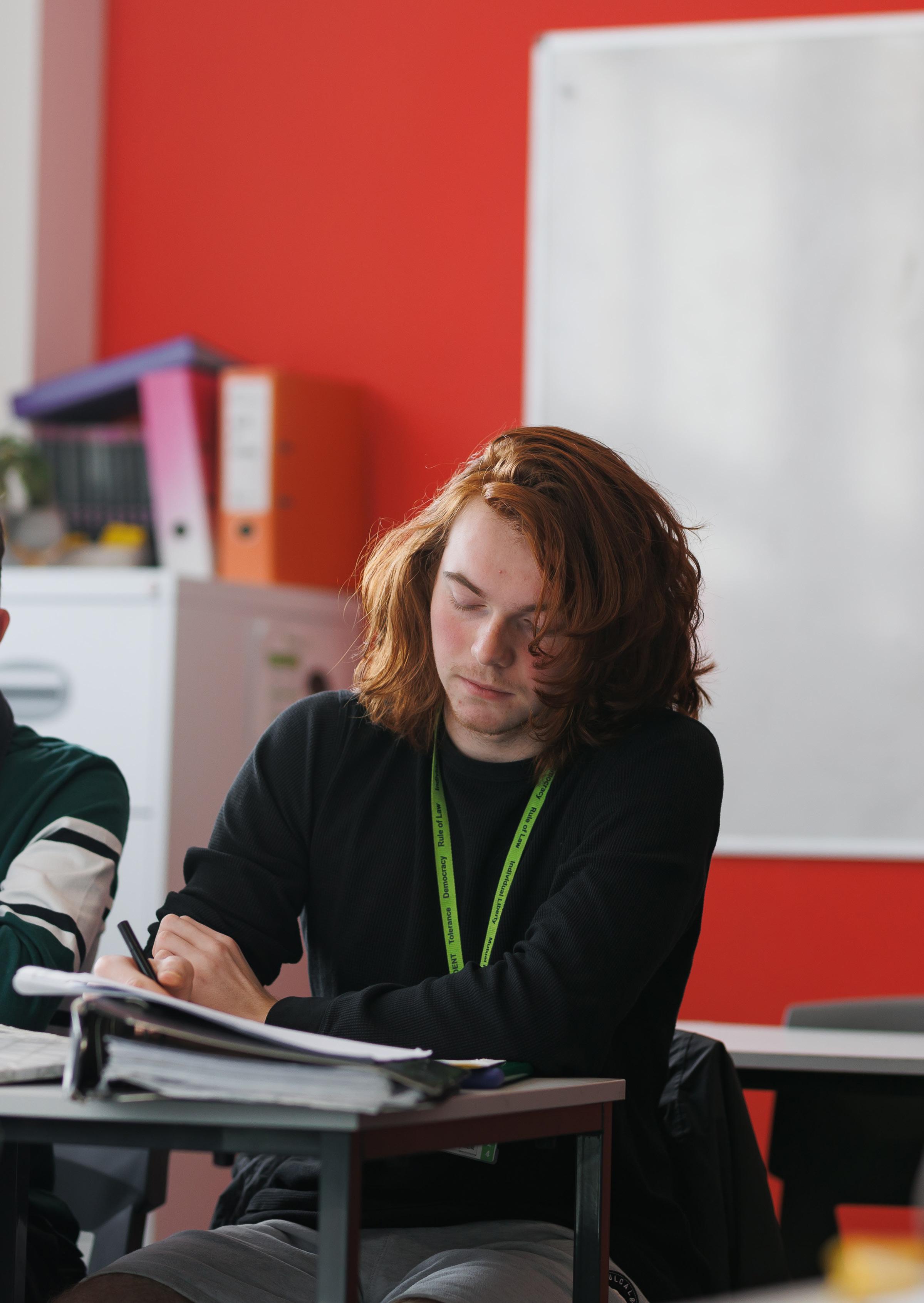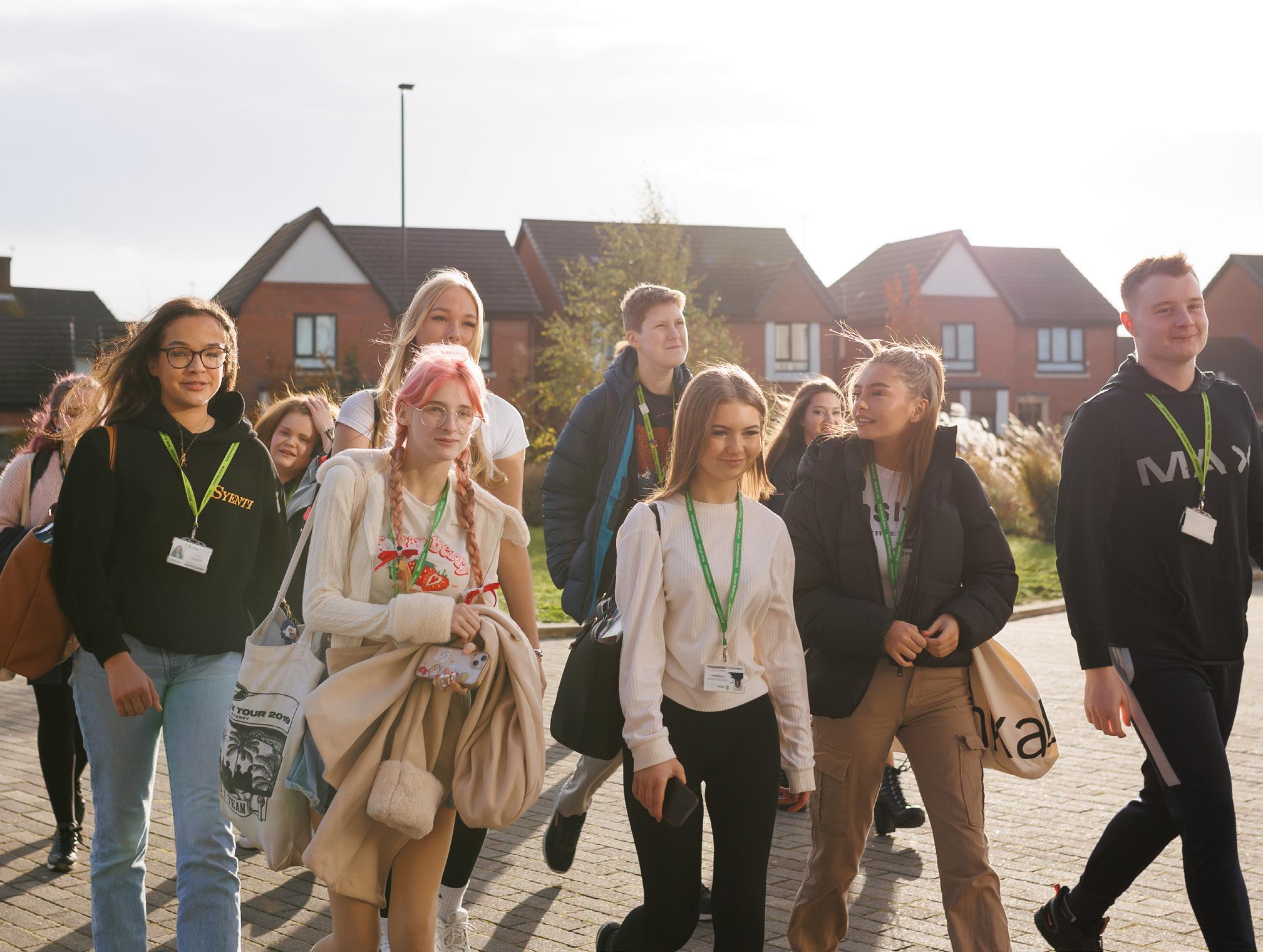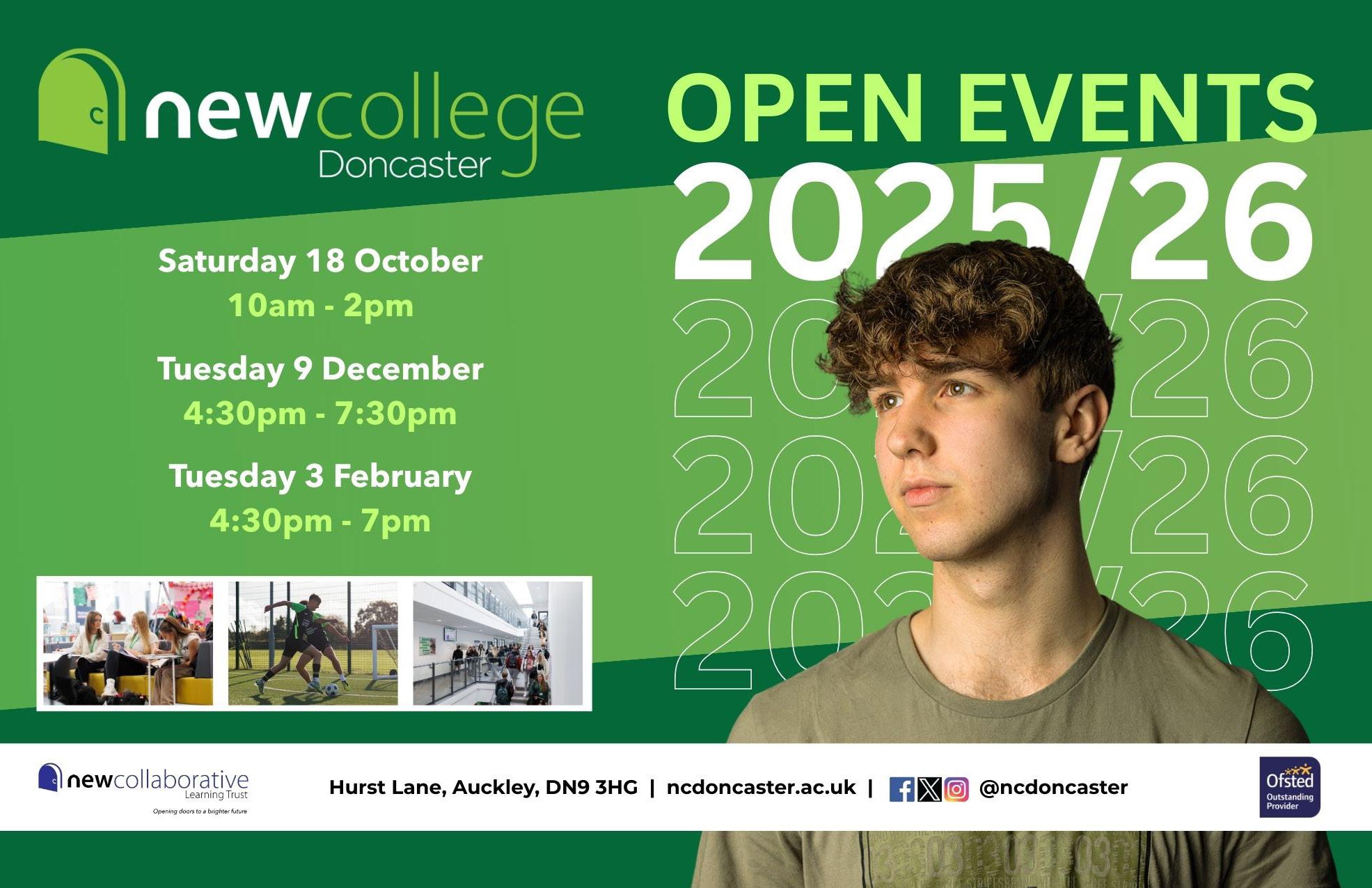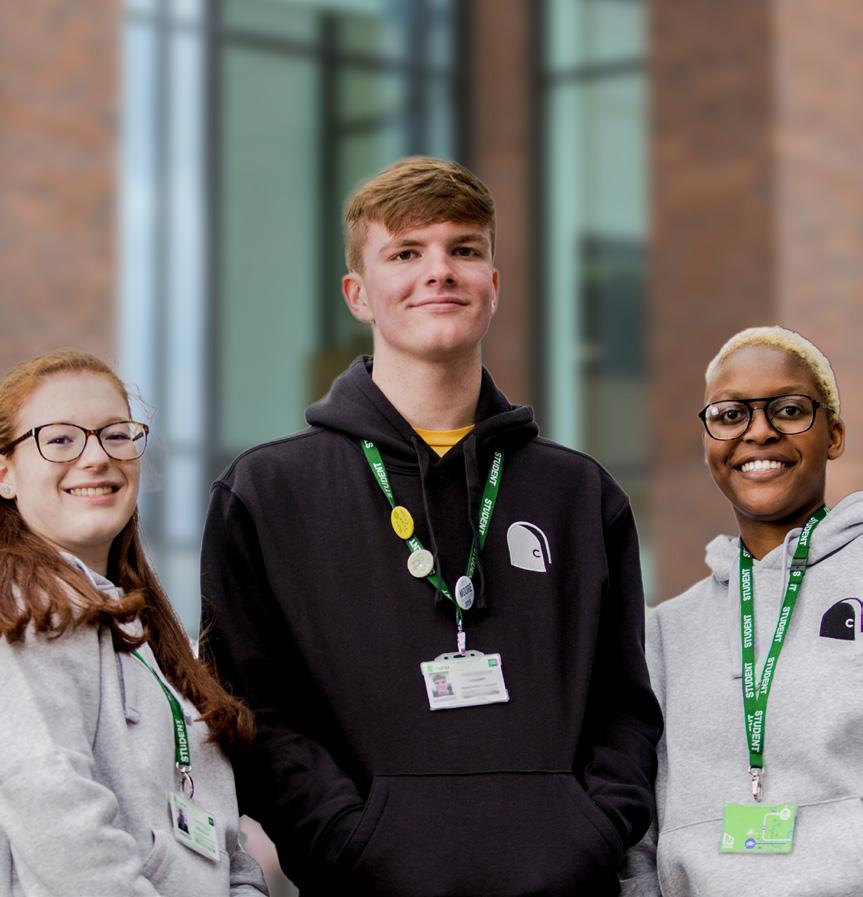2026 PROSPECTUS

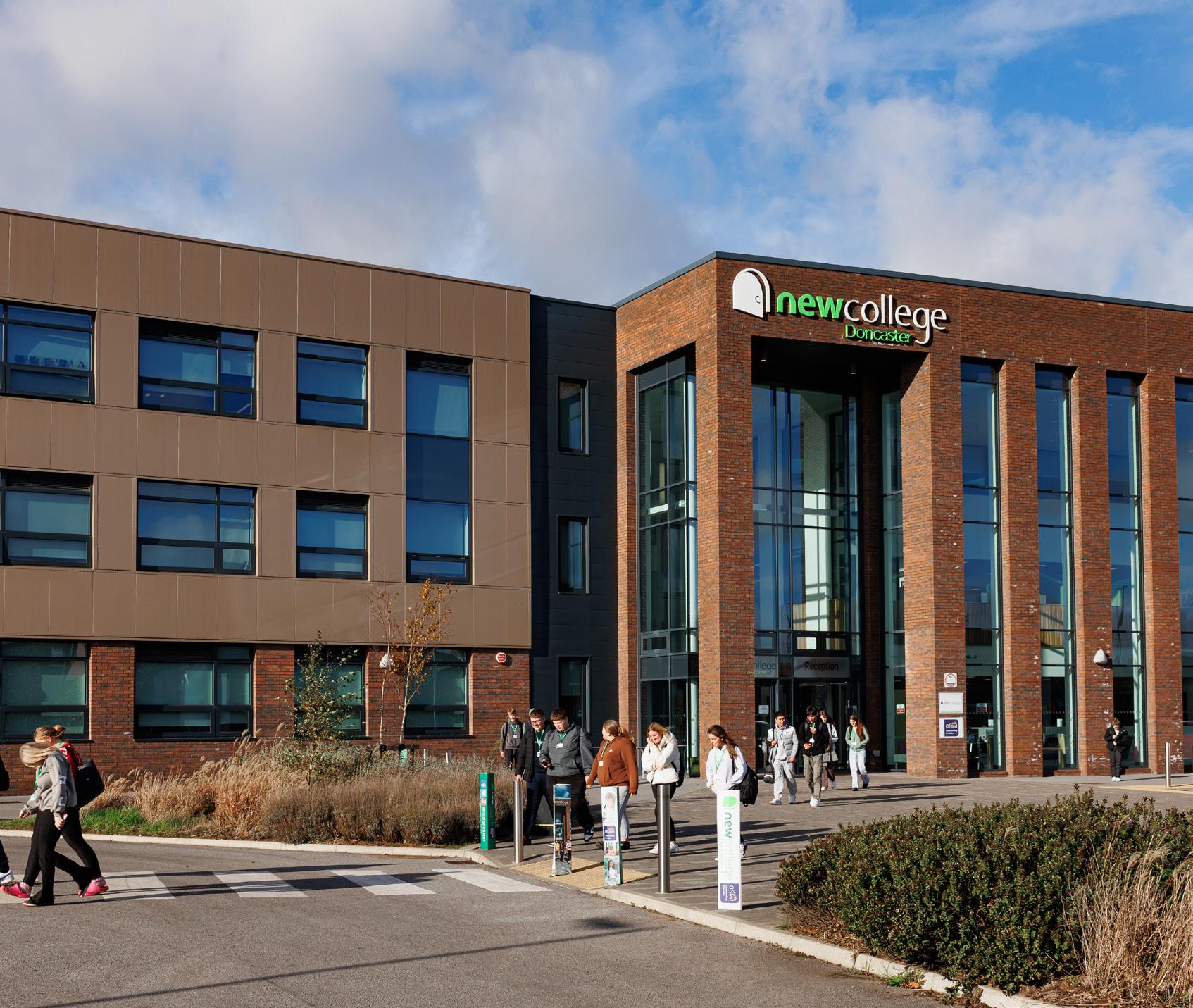
Ofsted, December 2021



Ofsted, December 2021
JACKSON,

Our results have gone from strength to strength since we opened in 2017. Students achieve very strong results both in A level and applied courses, making exceptional progress from their start points at the end of GCSE.
Results and student progress are consistently significantly stronger than national and regional levels. You can be confident that you will be joining a very strong academic, supportive and inclusive college that achieves outstanding results for young people.
As well as our focus on achieving excellent results, we are deeply committed to preparing our students for adult life, further study and employment, and to helping young people be happy, confident and safe. Our extensive enrichment programme helps students meet new people, gain new skills and learn more about the world around them.
Our students are well supported in their readiness to move to the very best degrees, apprenticeships and jobs, with valuable engagement with universities, employers and work experience.
This prospectus will give you a good introduction to the very wide range of courses that we offer. We would love to meet you in person at one of our open events taking place throughout the year. These are a great opportunity to meet our teachers face-to-face, to see our facilities, to get a feel for our culture, and to find out more about our courses.
“I LOOK FORWARD TO MEETING YOU THEN.”

of Progress Tutors who provide friendly and professional guidance from your first application interview to exam results day, and every point in between.
and enthusiastic teachers with expertise and specialist subject knowledge. where everyone is valued and respected. exam results.
with a great track record of helping students progress on to university, training and employment.
including the highly regarded Duke of Edinburgh Award Scheme, Turing Scheme, Performing Arts, Competitive and recreational sports and much more. to ensuring that the transition between your High School and New College is as smooth is as possible.

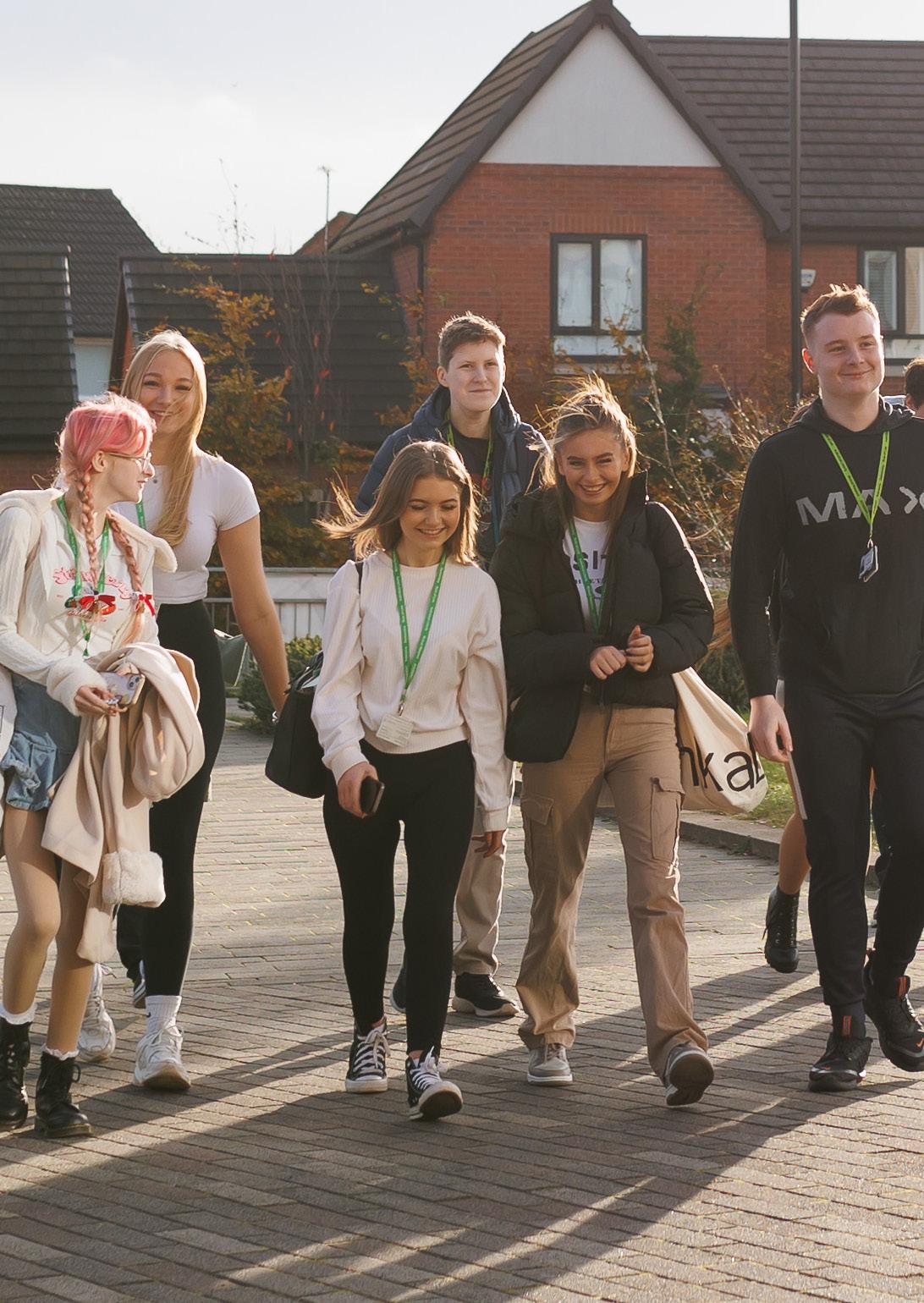
of A-level and Level 3 Applied General courses.
Where you are treated as young adult learners. with multiple floors of independent study space, IT facilities, textbooks, journals and bookable study rooms.
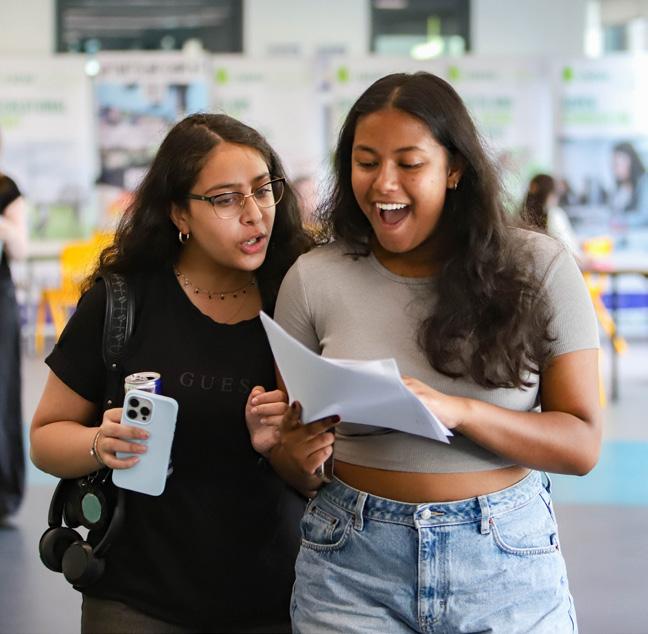
Students at New College Doncaster are celebrating another year of outstanding academic results, with outcomes that have enabled students to progress to their chosen university courses, apprenticeships, or employment opportunities.
This year, 54.6% of students achieved an A*, A or B in their A-level courses, with an impressive 81.1% of students achieving A*-C, and overall, 99.2% of students passed their A-level courses.
Students on Applied General courses also performed exceptionally well, with a 99.7% pass rate and 69.9% achieving a distinction or distinction*, the highest grades available on these qualifications. These figures may improve slightly as exam boards process requests for exam reviews.
Helen Jackson, New College Doncaster Principal, said, “We are thrilled with the achievements of this year’s students. Their commitment and effort have been outstanding, and it’s inspiring to see their determination rewarded with such excellent outcomes. These results not only open up exciting next steps but also reflect the strength of our teaching, support, and pastoral care.”
“Our staff have shown incredible dedication to helping students succeed. This commitment shines through in every grade achieved, and we are proud to continue to offer an environment where young people can thrive.”
The
1. Attend one of our Open Events. These are strongly recommended.
2. Apply online. Using the college website at: ncdoncaster.ac.uk/apply
3. Attend an interview. Where you will hopefully be offered a conditional place. We will write to you with all the details in advance.
4. Attend our Induction Day. [After your final GCSE exams] where you can sample lessons from the subjects you have chosen.
5. Bring proof of your qualifications. To Enrolment Day and become an official New College student.
We advise you to apply as soon as possible.
The sooner you apply, the sooner we can invite you to interview to discuss course options and availability.
It is unlikely that you will be offered a place if you miss the deadline due to recent high demand.
Our open events are a fantastic way to find out about all of our courses and are strongly recommended. See below for the dates and times of these events.
Saturday, 18th October 2025: 10am - 2pm Tuesday, 9th December 2025: 4:30pm - 7:30pm Tuesday, 3rd February 2026: 4:30pm - 7pm
If you have any questions or queries about anything related to applying to New College, then please contact student services on 01302 976777, or the school liaison team: info@ncdoncaster.ac.uk
If you are offered a conditional place you will be invited to enrol on either 20th or 21st August 2026. It is extremely important that you make yourself available on both of these dates so that you can attend at your allocated date and time. Details of appointments will be sent in July.
If you are not able to attend your allocated enrolment appointment you may find that course options are limited, or that places in college are no longer available. Please take note of these important dates.
All students who apply will be invited into college to have an interview with one of our experienced staff.
At the interview we will discuss your proposed course choices and find out more about your career aspirations. The interview is a key part of the application process and provides the opportunity to discuss your predicted qualifications and course choices, ensuring that they are right for you.
“STUDY SUPPORT AT NEW COLLEGE IS BEYOND AMAZING AND ACCOMMODATING OF YOUR NEEDS”.
EMILY - EX-NEW COLLEGE STUDENT
Your Progress Tutor will help you settle into college life when you arrive, and will support you as you adjust to the challenge of managing your workload and achieving your grades. Your relationship with your Progress Tutor will be key to ensuring you get the very best out of college life and engage with it fully. Tutorial sessions held once a week in Year 12 will be a mixture of one-to-one support sessions and important relevant topics, such as social and career related issues. In Year 13 your tutorial will be designed to support you with your UCAS application to university or apprenticeship/job application.
We need to know how you’re performing so we can help you achieve outstanding results. Both your Progress Tutor and subject teachers will review your progress on a regular basis, focusing on your achievement and attendance in each subject. Together you will agree targets to ensure motivation, direction and a clear plan of action to keep you on track and improving.
All this information will be recorded and will be accessible to both parents and students securely via Cedar, our online portal.
Every subject, every week will have a designated session for additional support, helping students to catch up on missed work, or to complete extension activities.
These Teacher Access Periods are one of the most important strategies we use to help students push themselves to achieve higher grades, or catch up if they have fallen behind.
There is a direct link between improved performance and contact time with teachers, which is why our Teacher Access Periods can make a real difference.

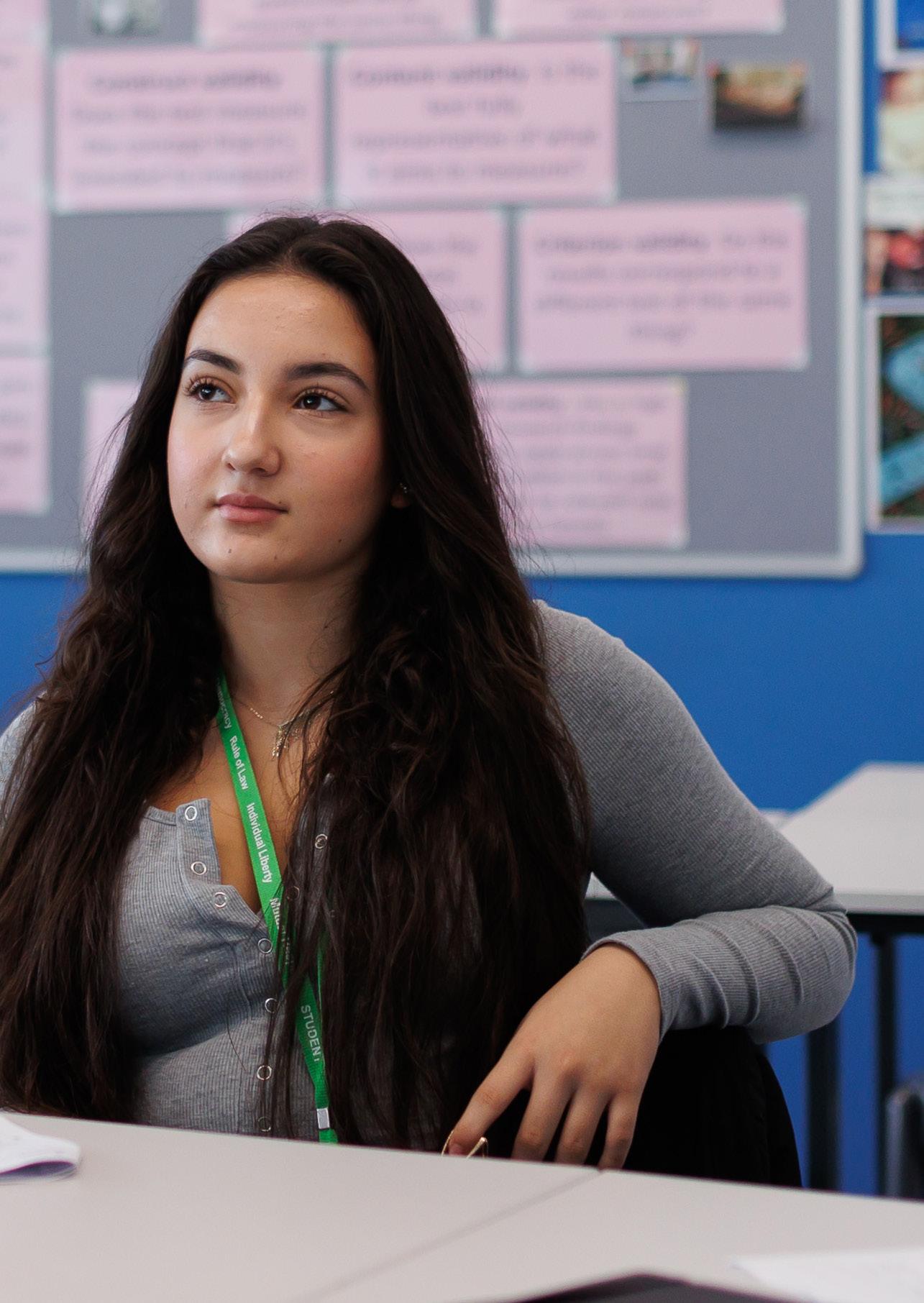
The Study Support Team will also help you maximise your educational achievements.
Our welcoming and professional tutors will give you individual help with any aspect of your studies, through a service that is open to all students, whatever their target grade. Students often seek help with study skills, writing skills and GCSE Maths and English. We actively promote a policy of inclusion, so specialist support is available for students with health problems or disabilities, such as cerebral palsy, autism and dyslexia.
Our provision often includes access arrangements for examinations, such as extra time and the use of computers. It is very important that you disclose any disabilities or difficulties on your college application so we can plan in advance to meet your needs.
Visit our website for more information.
Directed Independent Learning
This is at the heart of every students’ success.
Taking responsibility for your own learning is essential if you are to succeed in post-16 education.
College life differs in some important ways from school life, and this may be partly why you are interested in joining us. To start with, there are no uniforms and no bells, and you are encouraged to call staff by their first names. However, taking responsibility for your learning is a part of this young adult approach.
You will have study periods on your timetable where you will be expected to undertake your Directed Independent Learning.
You will set independent learning tasks for each subject: these will help you to feel prepared for lessons; to consolidate learning and to build up effective retrieval of the new knowledge you will be gaining throughout your courses.
The time expectation for this will increase as the courses progress.

New College offers support to students through a free and confidential counselling service which is provided for all students to access throughout their time at college.
The counselling service is provided by qualified counsellors and is here to provide students with the opportunity and space to think, talk and explore any difficulties they may be experiencing in a safe and non-judgmental environment.
The Wellbeing Hub also offers support to students from external agencies around mental health and wellbeing.
The college can provide financial support to help some students during their time at New College. Financial support includes:
• 16-19 Discretionary Bursary Support.
• Free College Meals.
• Travel Grant.
• Laptop and specialist equipment loans.
This financial support is means-tested and students may be eligible depending on their total household income and certain criteria.
To find out more about eligibility and how to apply, please visit:
ncdoncaster.ac.uk/supporting-you-financially
The Learning Resource Centre (LRC) offers students a range of services to support all your revision and study needs, as well as a wealth of resources for you to access, including books, journals, computers and other hardware, digital resources and audio-visual materials.
The LRC also offers facilities to suit all of your study preferences, such as bookable study rooms and group rooms.
Whatever you may need to support you outside of lessons, you can find it here.

Microsoft Teams will be an important resource during your time at New College.
Your teachers are likely to set your directed independent learning tasks through Teams, as well as giving you access to a wide range of supportive learning resources.
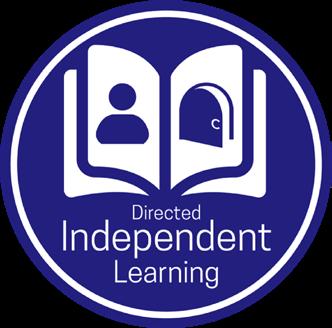
At New College we provide tailored support for you so that you have the very best chance of progressing from New College to a great university, apprenticeship or job.
We’ll ask you to review your career plans at key points, so that we can signpost relevant talks by visiting universities or employers, or arrange for you a careers interview. We’ll support you in finding high quality work placements if you have particular careers in mind, such as medicine or teaching, or if you’re studying Applied General courses which include work placements, or if you’re considering work or apprenticeships rather than university.
The broad range of activities available as part of our Excel@NCD programme have been specifically designed to prepare, support and engage all students in their applications to university and degree level apprenticeships. This includes applications to Russell Group universities, Oxford and Cambridge, and for very competitive degree courses which have extra hurdles to overcome. We’ll also create opportunities for you to engage with universities, employers or apprenticeship providers within the courses you are studying.
The Russell Group represents 24 leading universities who are at the cutting edge of academic research and provide an outstanding teaching and learning experience for their students. Many of our students go on to attend Russell Group universities, studying subjects such as English, History and Maths, or Dentistry, Medicine and Veterinary Science. Russell Group universities, like Oxford, Cambridge, Leeds, Manchester and York are the most competitive HE institutions in the country. The Russell Group have high expectations of their undergraduates, particularly focussing on academic achievement.
Our careers team have helped thousands of students get places on degree courses at these universities and, along with the support from Progress Tutors and subject staff, are well placed to maximise your chances of success.

The Excel@ programme is tailored to each individual student, and could include:
Oxbridge Programme
• Visits to Oxford and Cambridge.
• Visiting speakers from the universities.
• Support from former New College students who have attended Oxford and Cambridge.
• Dedicated support at every stage of the application process.
• Highly experienced support with personal statement and interview preparation.
• Information and support on external pre-interview assessments.
Achieving Aspirations Programme
The Achieving Aspirations Programme focuses on supporting students in successful applications to competitive courses and universities such as the Russell Group, including Oxford and Cambridge. The programme offers dedicated advice, information and skills development related to all aspects of the application process from a specialist team, allowing students to maximise their chances of not only securing places at centres of academic excellence, but of thriving once they are there.
Medic, Dentist & Vet Group
• Aptitude test information (BMAT & UKCAT).
• Support with interview preparation for Multiple Mini Interviews (MMIs).
• Talks from ex-New College students and other medical, vet and dental professionals.
• Support with arranging work experience/voluntary work required for university applications.
Widening Participation Scheme
Working closely with a number of local universities, we promote opportunities to help students throughout Years 12 and 13, where they have limited experience of higher education. Such support includes:
• Attending subject taster sessions.
• Preparing for independent living at a university.
• Access to undergraduate mentors.
• Specialist advice on personal statements and interviews.
• Attending summer residentials.
• Lower conditional offers awarded as a result of participating in the programme.
Extended Project Qualification (EPQ)
• How to find and evaluate appropriate sources and to reference them correctly.
• Reading and note-taking strategies.
• Interpreting data and analysing evidence.
• Academic writing.
• Presentation skills.
• Nationally recognised qualification accepted by universities.
• Research Skills Project: a bespoke, NCP mini-EPQ programme – offered as a stand-alone enrichment or as a springboard to the EPQ.
Supercurricular Activities
• Advice and access to extra courses (Summer Schools, online courses such as MOOCs).
• Advice and support with wider reading beyond your subject.
• Communication skills: develop confidence in debate, discussion and public speaking.
• Oracy award.
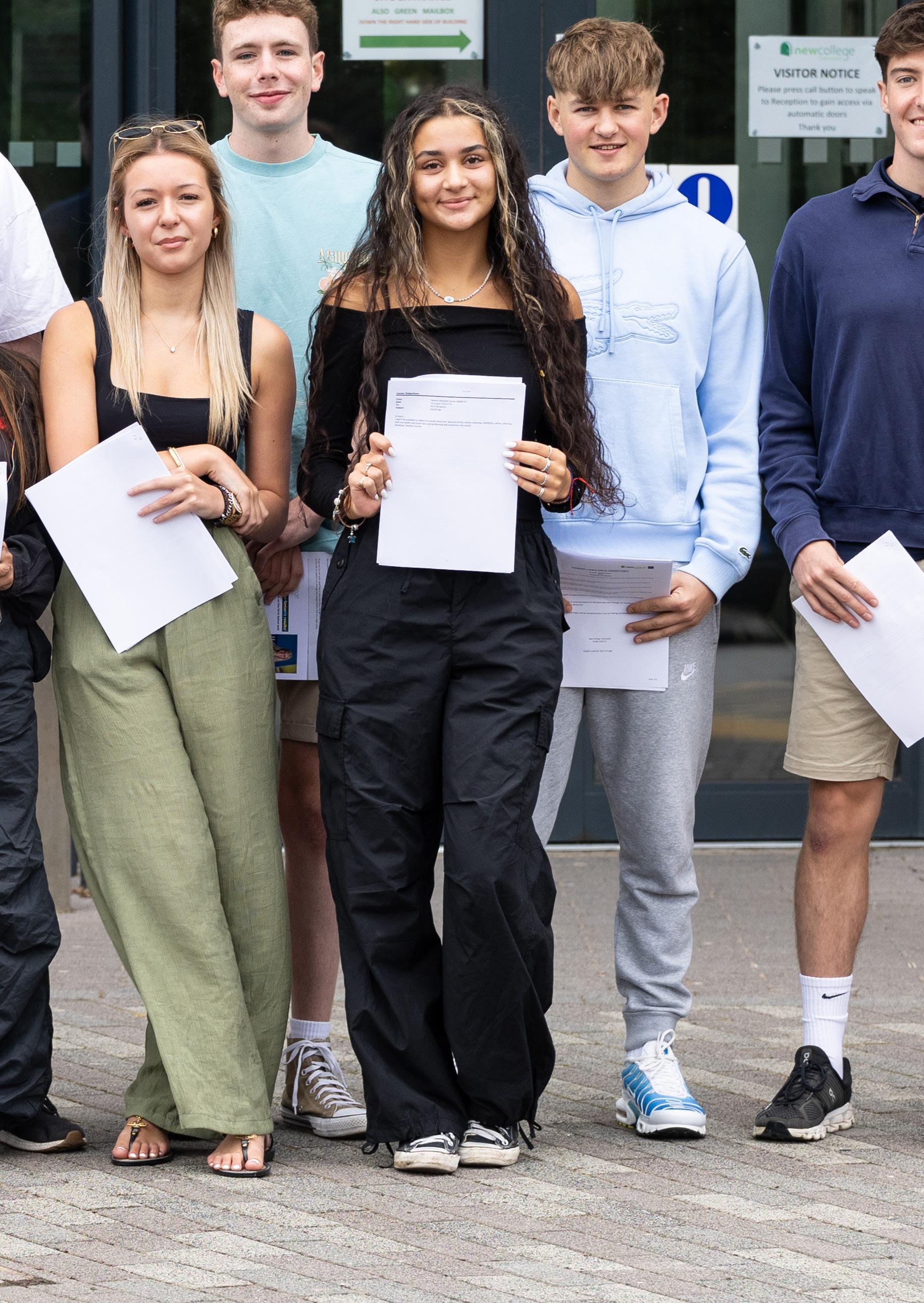
At New College we take your next steps very seriously. After your two years with us you will be able to progress with the qualifications and employability skills you need to succeed in the world of work or in your further studies. We call this the OPTIC scheme.
New College encourages all students to participate in the Work Experience Programme. For students applying to some university courses, work experience is a requirement. For others, it may be an integral part of their college course. For all students it will provide them with a valuable experience of the workplace and the opportunity to develop new skills and knowledge to support their future career goals.
You will be given support before, during and after your placement to ensure you have a successful experience in a relevant, safe and friendly environment.
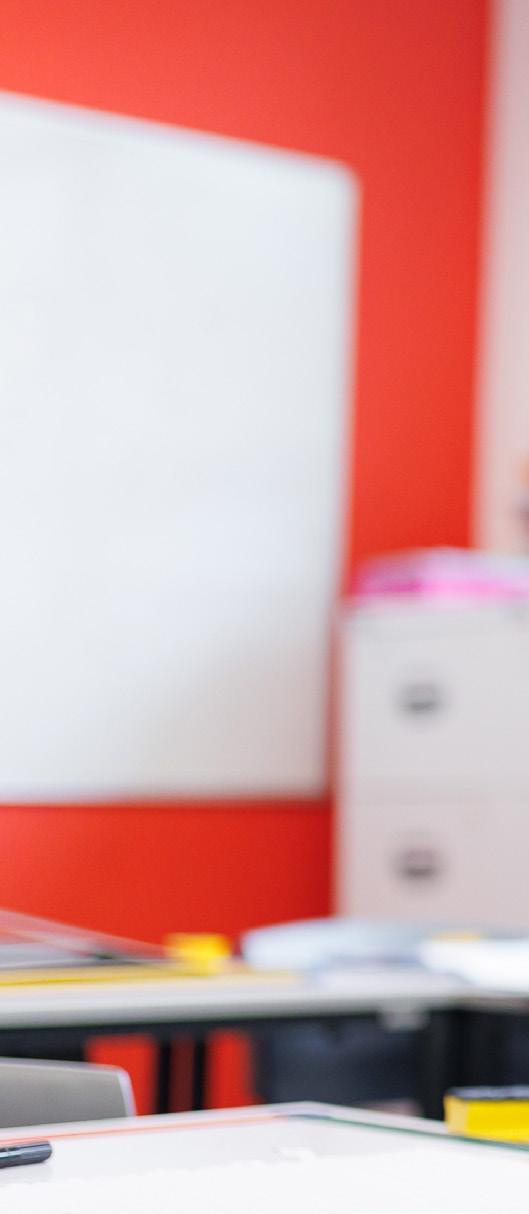

Qualified Careers Advisors work alongside our Progress Tutors to ensure you receive specialist guidance as you plan for your next steps after college. You will be encouraged to research your options carefully as you plan for your future, whether that be in the world of work or university.
Progress Tutors also provide career guidance as you plan your next step after leaving us, whether this is going on to university, an internship, gap year or employment. They will encourage you to research your options and support you along the way, helping you to plan your future, whether that be in the world of work or university.
A large number of New College students progress to Higher Education each year.
We provide specialist advice for students considering applying for competitive courses such as dentistry, medicine and veterinary science, as well as supporting students applying to universities from across the country. In the summer we hold an annual Careers and HE Day with over 100 speakers from local universities and employers.
We also work hard to support our students who may be seeking employment or apprenticeships after studying at college. This includes our annual apprenticeship fair and parents/carers event.
We support our students seeking employment with application form preparation, CV writing, group assessment day and interview practice, and with adverts for suitable vacancies and apprenticeships.
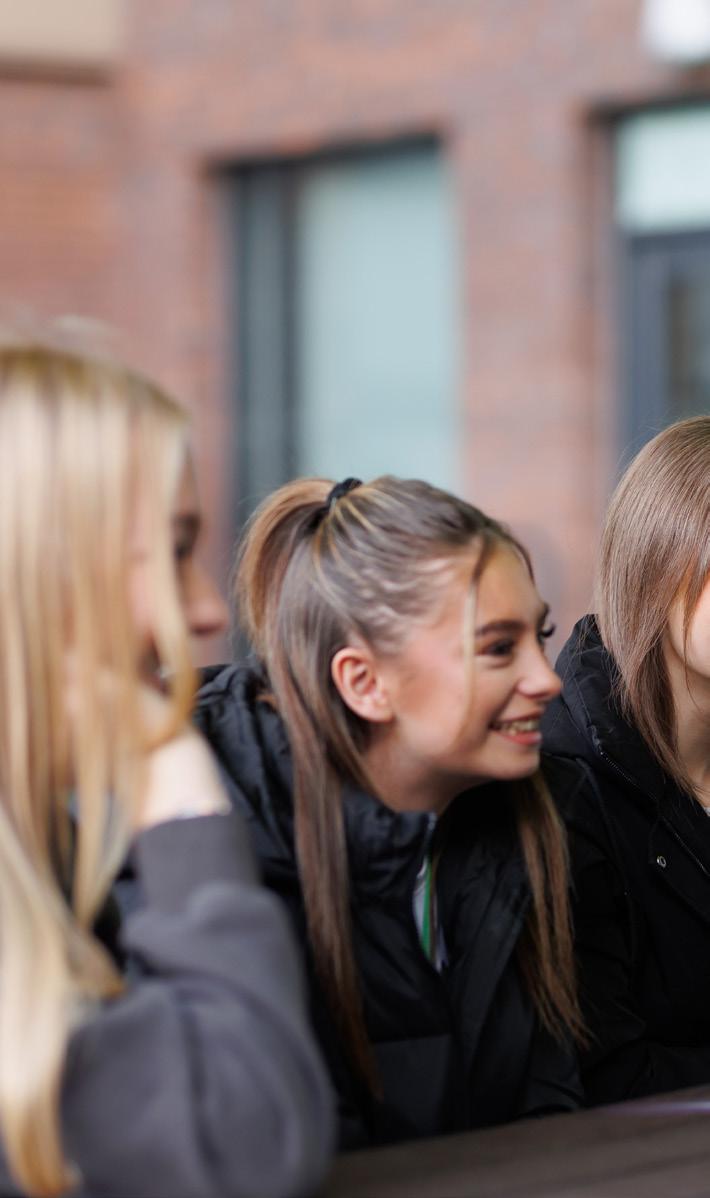
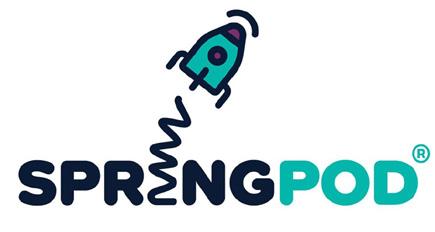
Springpod offers free virtual work experience with top employers, helping sixth form students explore careers, gain real-world skills, and boost their CVs through interactive tasks and expert insights
At New College, we are committed to helping every student make well-informed decisions about their education and future career.
To support this, we have invested in Pathways One and Pathways Explore - an advanced digital platform that links our courses directly to real-world career opportunities. This allows you to browse a wide range of career options, with over 850 occupations linked directly to the courses we offer and ensures you can clearly see how your interests translate into relevant study options at our college.
One of the key features is a short, engaging quiz that matches your interests and attributes to six personality types, such as Realistic, Investigative, or Artistic. Based on your profile, the platform recommends suitable careers and connects them to relevant courses. Each career profile includes detailed labour market information, including salary expectations, job growth forecasts, and progression routes-whether academic, vocational, or apprenticeship-based. You can also explore similar job roles, live vacancies, and local apprenticeship listings.
Whether you are considering A Levels or Applied General qualifications, Pathways One provides clarity and guidance, helping you to understand how your course choices can lead to meaningful employment outcomes.
You can access Pathways One on each of the course pages of our website and you can access the Pathways Explore service by scanning the QR code or visiting:
ncdoncaster.ac.uk/pathways-explore


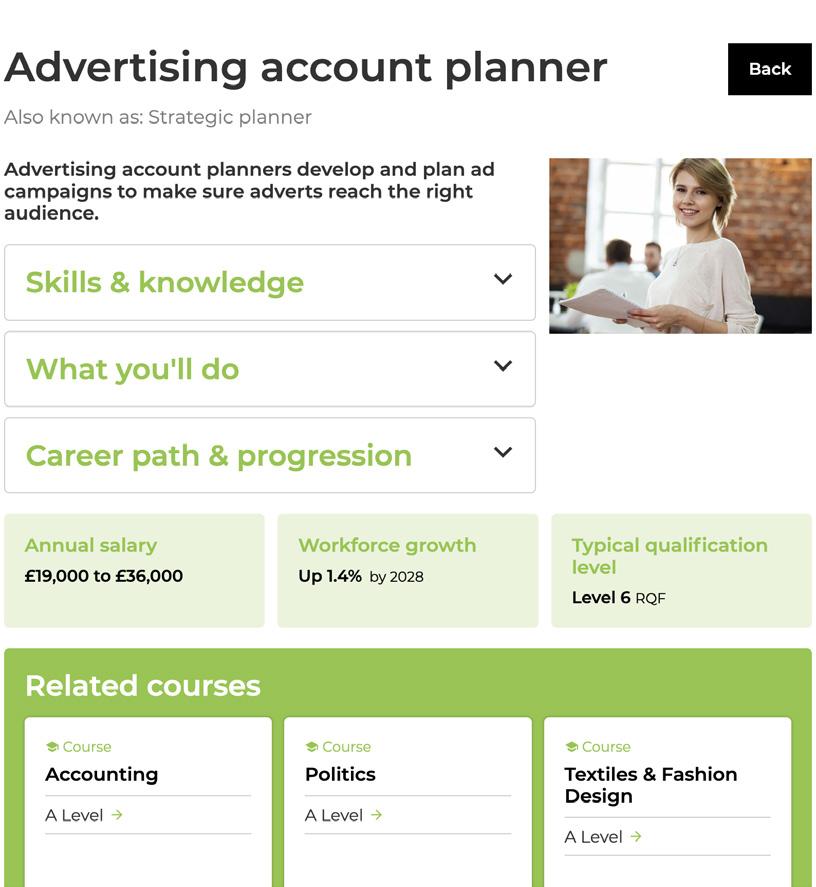

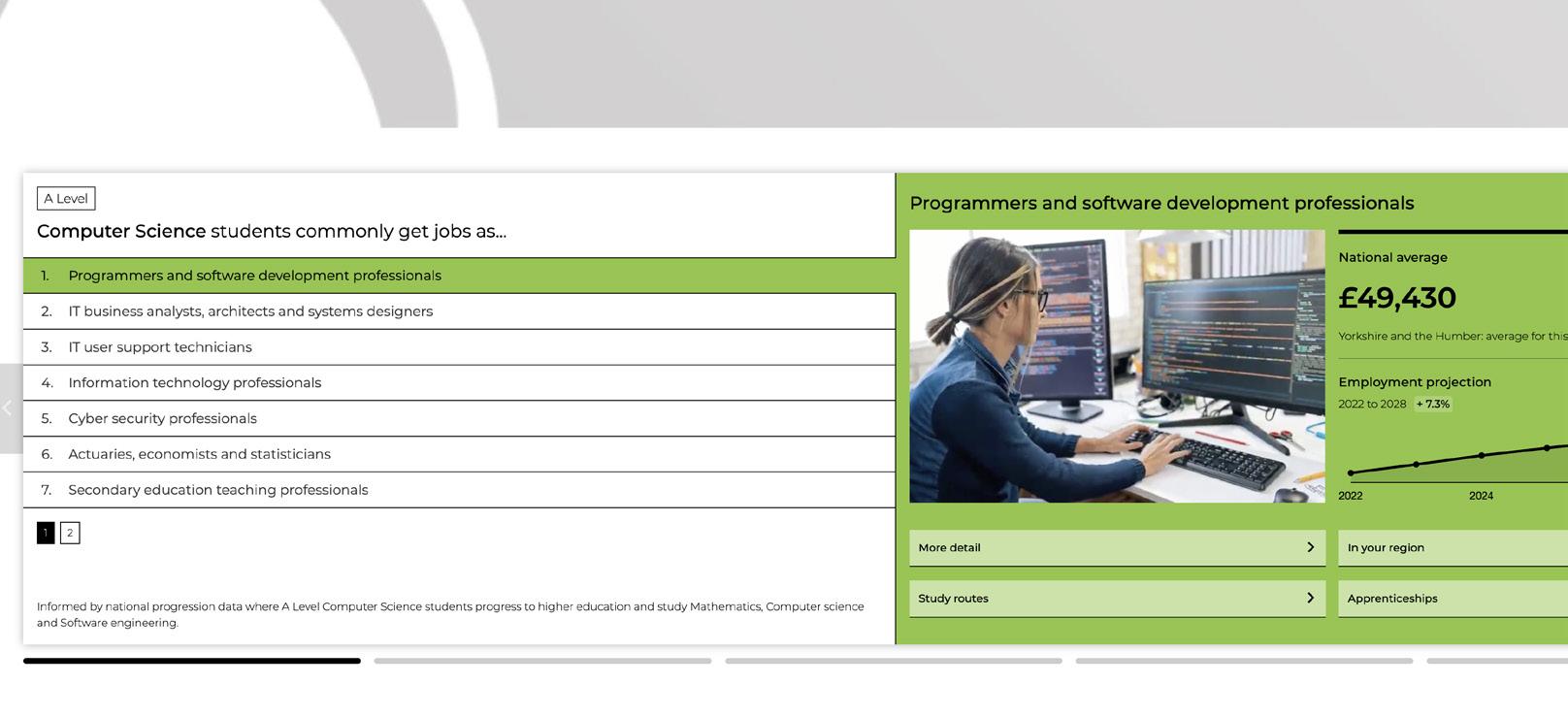
Our expanded enrichment programme encompasses a wide variety of activities and sessions that students can participate in, with over 80 activities taking place this year.
All of these are aimed towards enriching the academic curriculum, developing new skills and interests, promoting teamwork and social skills, and most of all having fun!
Students at New College take part in a range of enrichment activities whilst studying with us, helping to develop well-rounded individuals, with a wide variety of skills and experiences to help them stand out from the crowd in the next stage of their education or employment and future career.
Students can sign up to a number of activities throughout their two years, some being individual sessions and others lasting the entire academic year.
All students have the opportunity to develop a leadership role within the college by getting involved in the Student Executive Committee. Students in Year 13 are able to stand for election to lead an area/group within college, whilst the opportunity to work within one of the groups is available to both Year 12 and Year 13 students.

For more information about any of our enrichment programmes, please visit:
ncdoncaster.ac.uk/enrichment
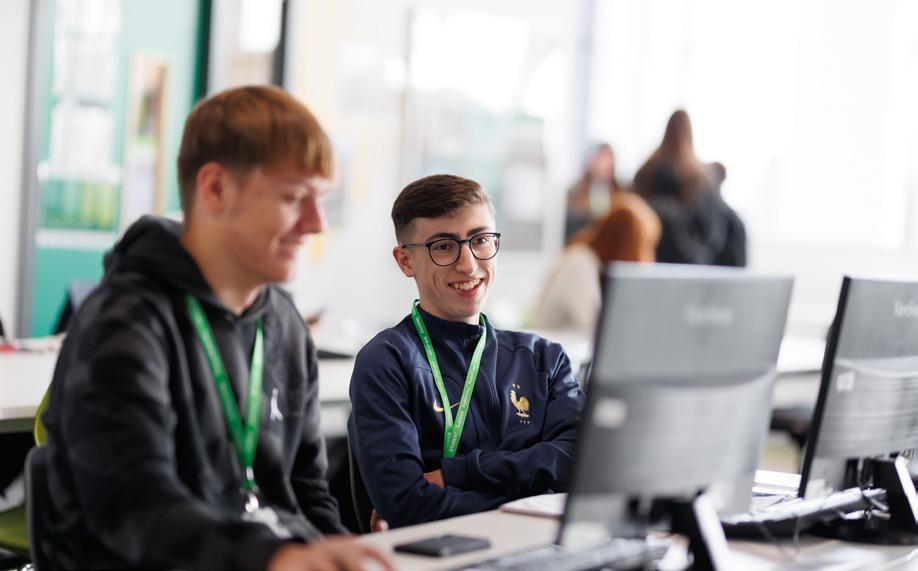
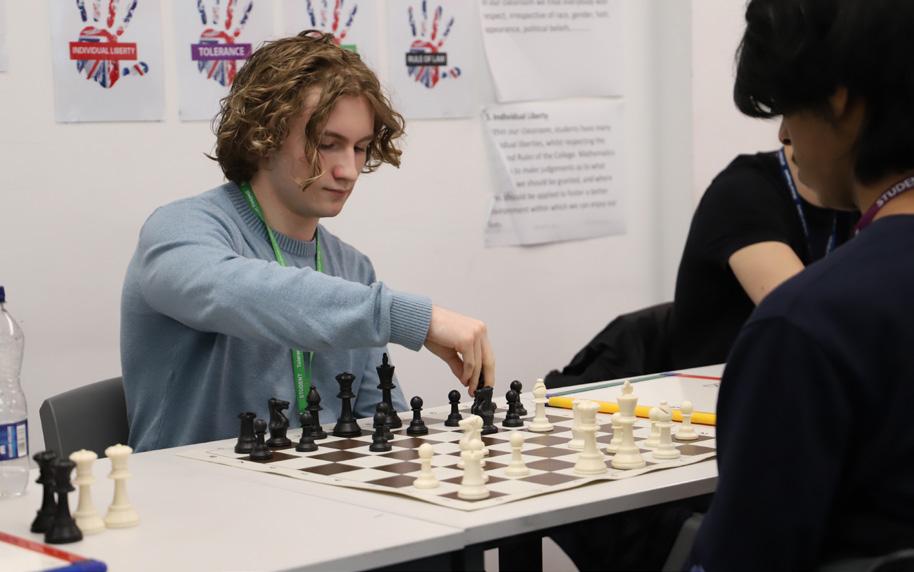
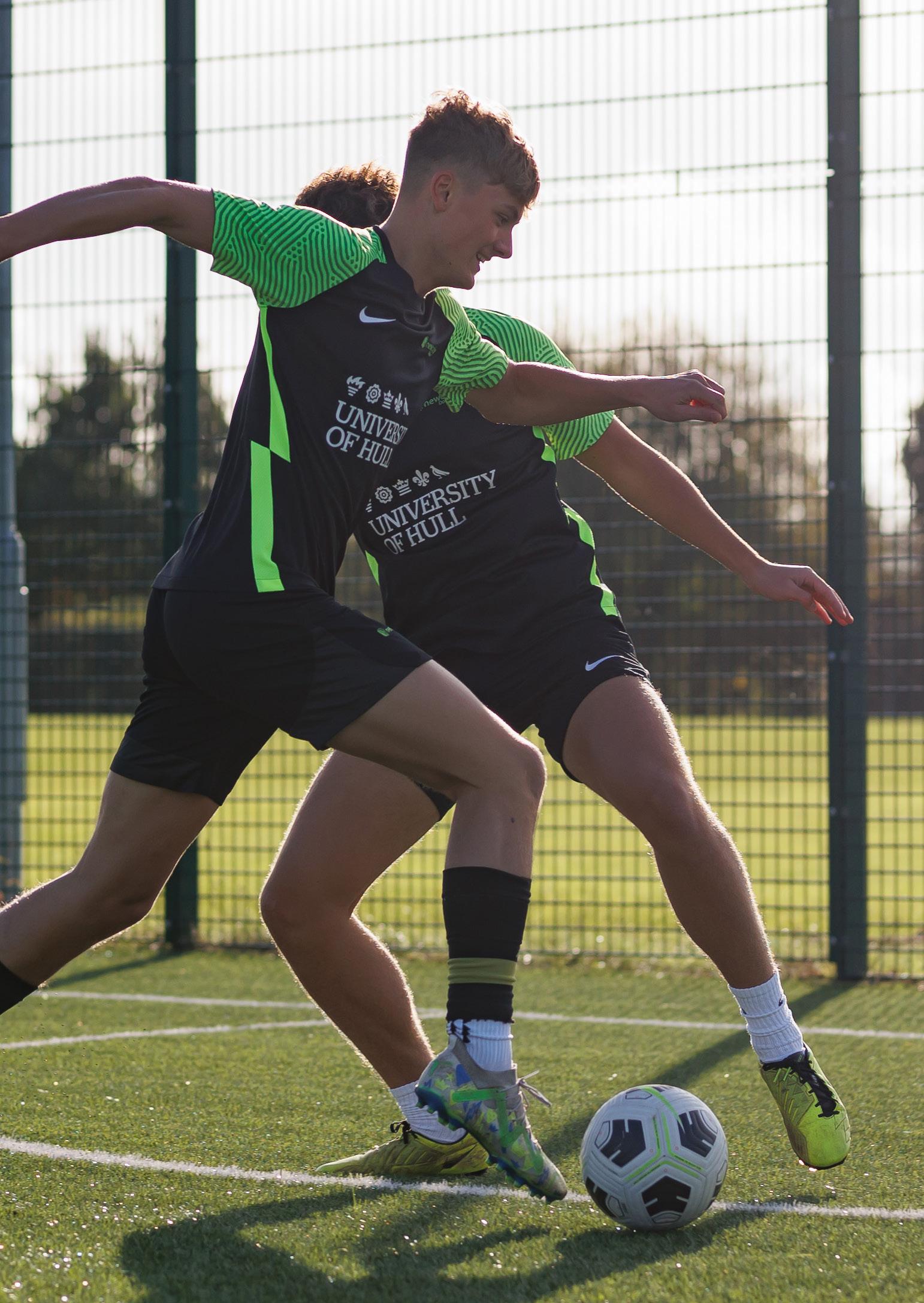
The enrichment activities we offer here at New College can be split into the following categories:
These activities aim to develop students’ physical and mental health, whilst also enhancing vital skills that are often required when participating in physical competitions including teamwork and co-ordination. Activities include Stress Less and Self Kindness, as well as a wide variety of recreational activities including Badminton, Table Tennis, 5-a-side Football, Cricket, Emergency First Aid and Self-defence.
Developing skills and experiences that build character as well as providing valuable experiences are fundamental to personal development. You’ll have a wide variety of experiences to take part in including Dragons Den Enterprise, NHS Values, and Sports Leaders. Popular activities also include the Turing Scheme and Duke of Edinburgh Award scheme, both of which are widely recognised in the world of work and held with high regard.
Our super curricular sessions enable students to develop a greater understanding of the subjects in which they have enrolled. Within these sessions they will often cover a wide variety of topics focusing on areas that may not be included in their course specifications, helping students develop their understanding of their subjects and the wider reading required.
Some of our super curricular activities include: Genetic Engineering, History Book Club, Philosophy Thinkers Club and Creative Writing. These can be hugely beneficial to students who may go on to further study of these subjects at undergraduate level.
Participating in one of our clubs and societies is a great way to meet like-minded people and make new friends. Here at New College we have over 30 separate clubs and societies for you to participate in including LGBTQ+ Group, Darts, Esports, Feminist Group, STEM Club and the Legal Debate Club, with many more being planned and developed throughout the year.
Incorporated within our enrichment programme are a range of competitive sport programmes. By enrolling on to these programmes you will represent the college within the chosen sports and have the opportunity to compete against other teams from across the North of England. Each of the following competitive sports also has dedicated time allocated within your timetable to take part in training and competitive fixtures:
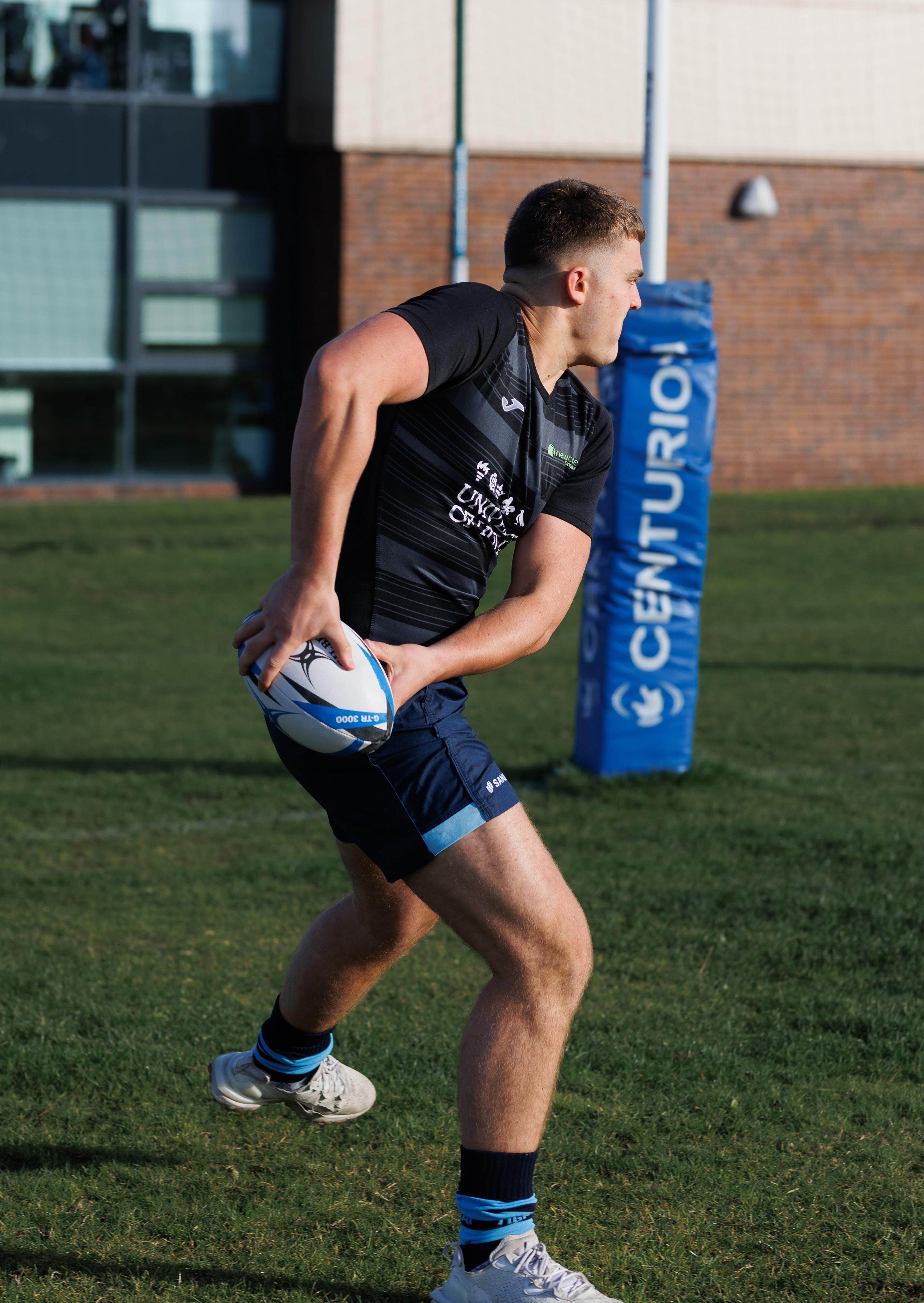
New College Doncaster underwent a full Ofsted inspection in December 2021. We are extremely proud of the feedback and grades that the college received:
• Overall Effectiveness – Outstanding
• The quality of education – Outstanding
• Behaviour and attitudes – Outstanding
• Personal development – Outstanding
• Leadership and management – Outstanding
• Education programmes for young people – Outstanding
• Provision for learners with high needs – Outstanding
“Students benefit from very high-quality teaching. Teachers demonstrate a very comprehensive knowledge of their subjects and communicate this well to students. They successfully develop students’ understanding of the technical terminology used in their subject areas. As a result, students quickly develop the new knowledge that they need when they leave college.”
“The learning environment at the college is highly conducive to successful working, quiet when necessary for research and thinking time, but also open and welcoming to allow students to feel confident enough to ask and answer questions.
Students value this environment and participate actively in their lessons. They concentrate well, work hard and demonstrate a disciplined approach when working independently.”
“Leaders and staff successfully support students to become highly respectful and active citizens. Students have an excellent understanding of British values such as mutual respect and tolerance, and endeavour to emulate these values. They are very respectful and courteous to each other, to staff and to visitors to the college. They feel safe at college and are confident that, if they have any concerns, these will be addressed quickly.”
“Teachers plan and deliver the curriculum in a logical order to build on students’ prior learning and to develop their knowledge and skills quickly. Students rapidly apply what they know and move on to more difficult concepts.”
“Support for students with high needs is very strong. This support enables students with high needs to settle into college life, contribute to lessons well, and make significant progress in achieving their planned outcomes.”
“Students benefit from excellent pastoral and academic support. This includes targeted interventions to ensure that any students who are behind target very quickly catch up.”
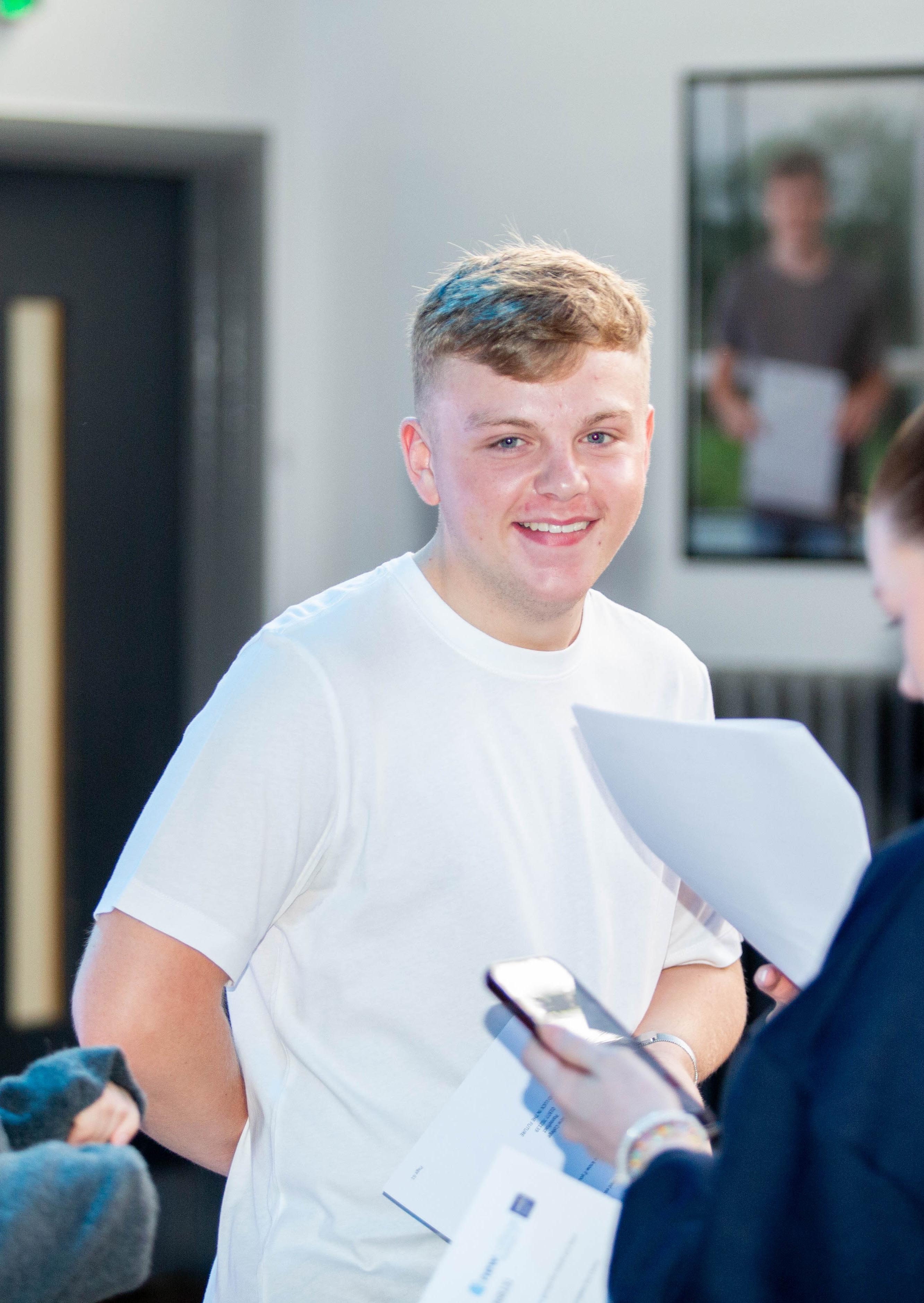
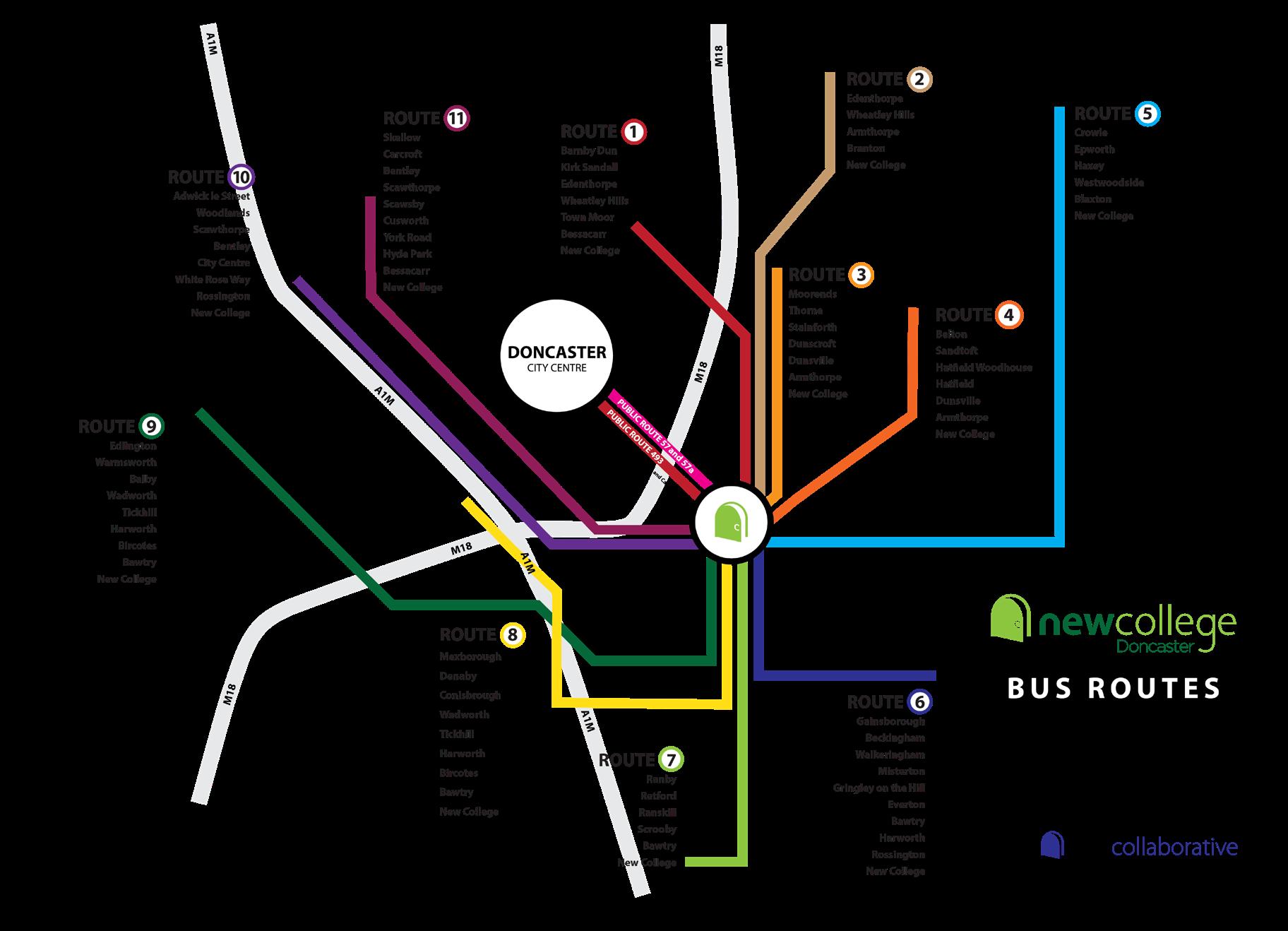
For all bus routes you should arrive at the bus stop 5 minutes before departure and signal the bus to stop.
• The bus will NOT STOP unless an indication is made to the driver that you wish to board!
• ALL BUSES CAN BE BOARDED AT ANY BUS STOP ALONG ALL ROUTES.
• To travel on a New College bus, you must have a New College bus pass and it must be shown on each journey.
• Timings are subject to change, please check our website for the most up-to-date information.
Transport provision for college includes routes from locations in South Yorkshire, North Nottinghamshire and North Lincolnshire. This provision is a mixture of either public service buses or one of our private college services.
You can currently get a bus directly to college from any of the locations opposite. We are currently reviewing our provision to extend it to even more locations so please check our website for updates on the routes and services from your area.
To find out more about transport to the college, including downloading our latest travel information booklet, street by street guide, latest bus pass pricing information and further information on the public services that service the college, please visit our website on the url or by scanning our QR code below:
www.ncdoncaster.ac.uk/travel
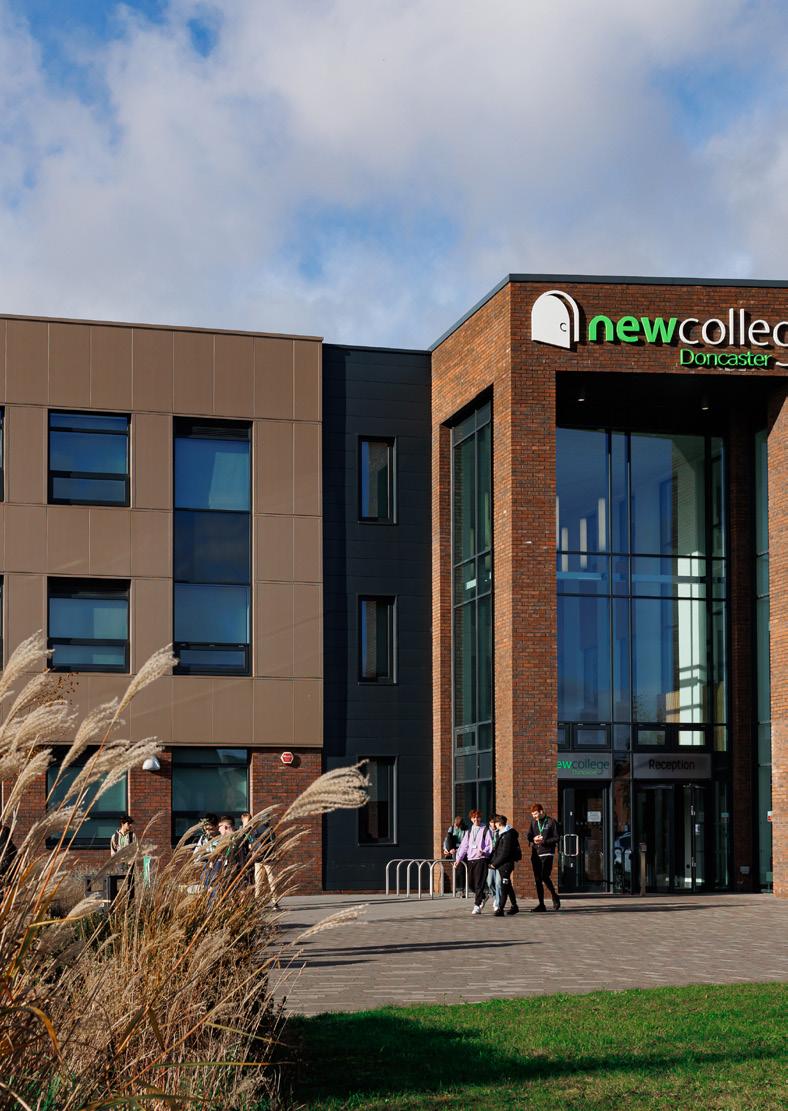
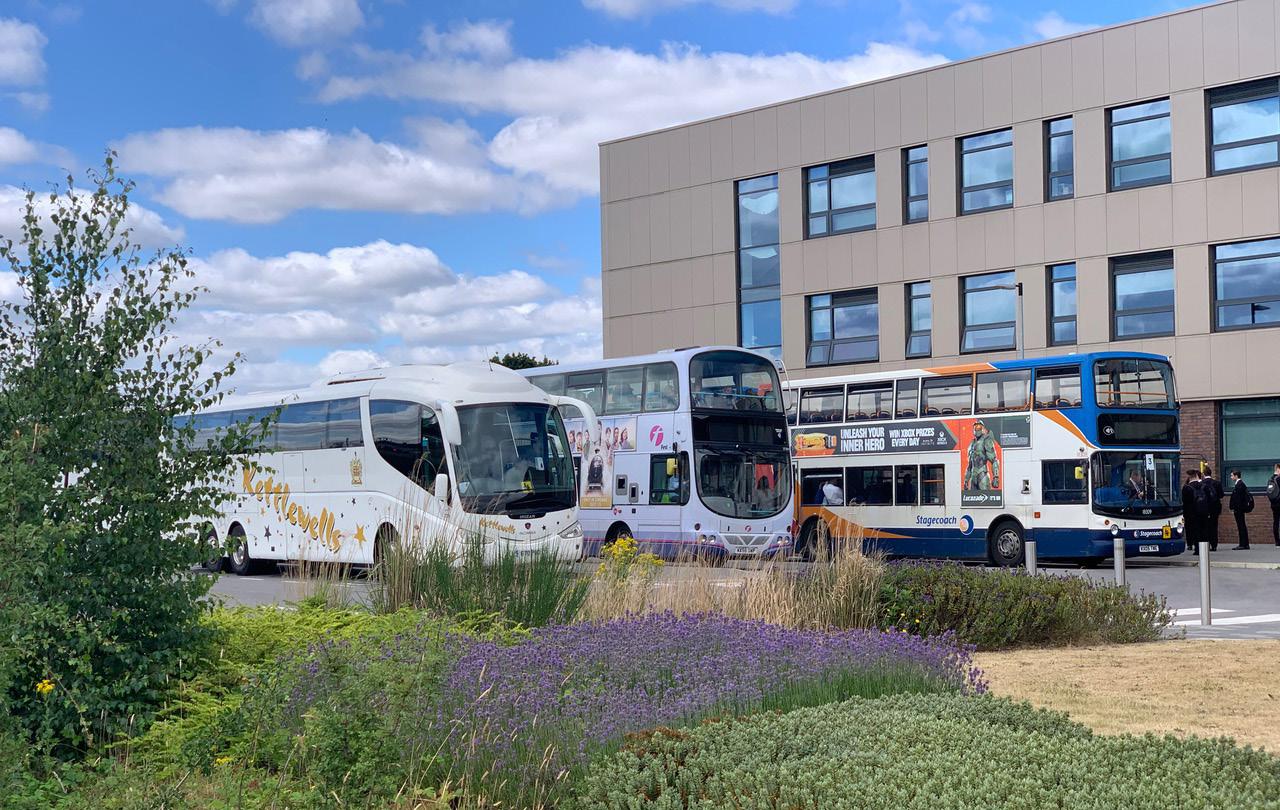
These routes were correct at the time of publication but are subject to change
*Please see our website for the most up-to-date information.
We are a multi-academy trust comprising of three sixth form colleges, a secondary academy and three primary schools. We have a strong track record of improving the quality of education, raising aspirations and helping young people progress to higher education, apprenticeships and careers. Dinnington High School and Brinsworth Academy will officially become part New Collaborative Learning Trust this year.
Our vision: Our colleges and schools will make a significant difference to the lives of young people. As a result, together we will make a positive contribution to social mobility.
Our Commitment: To provide an outstanding, consistent student experience through collaboration.
Candour: To be open, honest and fair to everyone.
Challenge: To have high expectations of ourselves and each other.
Collaboration: To learn from each other for the benefit of all.
Commitment: To be dedicated, resilient and strive for continuous improvement.
Care: To be considerate of other and their needs.
New Collaborative Learning Trust won Employer of the Year at the 2023 MAT Excellence Awards. The national awards celebrate the very best performers from over one thousand MATs across the country.
NCLT were also shortlisted for Wellbeing MAT of the year, reflecting their commitment to putting staff and student wellbeing at the heart of their strategies and policies.
As we continue to thrive, we know that looking after our staff and students is key to our future success.

Address: Nelson St, Broomfields, Bradford BD5 0DX
Phone: 01274 089189
Address: Hurst Ln, Auckley, Doncaster DN9 3HG
Phone: 01302 976777
Address: Park Ln, Pontefract WF8 4QR
Phone: 01977 702139
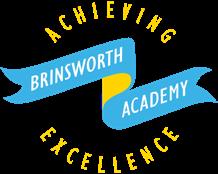
Address: Brinsworth Road, Brinsworth, Rotherham, S60 5EJ
Phone: 01709 828 383
Address: Doe Quarry Ln, Dinnington, Sheffield S25 2NZ
Phone: 01909 550066
Address: Wingfield Rd, Rotherham S61 4AU
Phone: 01709 513002
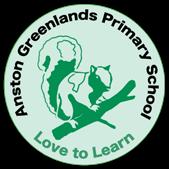

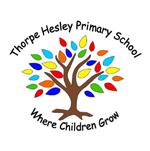
Address: Edinburgh Dr, North Anston, Sheffield S25 4HD
Phone: 01909 550557
Address: Kimberworth Park Rd, Rotherham S61 3JT
Phone: 01709 740350
Address: Upper Wortley Rd, Thorpe Hesley, Rotherham S61 2PL
Phone: 0114 257 0153
New College represents an important stepping-stone between high school and university or employment.
We treat our students as young adults in a supportive but challenging environment, helping you to feel safe whilst stretching you to perform at your best, academically and with our enrichment programme. This means we expect you to take more responsibility for your own learning and to act as responsible adults, whilst giving you more freedom, for example around how you use your time outside of the classroom. Our tutorial sessions are an essential part of the New College experience and have been specifically designed for our 16-19 students by our specialist team.
This carefully developed tutorial programme covers key information on:
NEW COLLEGE’S CULTURE.
MENTAL HEALTH, WELLBEING & RESILIENCE. HEALTHY RELATIONSHIPS.
FUNDAMENTAL BRITISH VALUES.
CURRENT AFFAIRS & WIDER TOPICAL ISSUES. NEXT STEPS AFTER COLLEGE: Including Degree Apprenticeships & university.
We recognise the importance of becoming well prepared for your future and this bespoke programme enables you to move onto positive destinations, building and developing your skill set along the way.
You will have tutorial once a week as a group, but then your Progress Tutor will meet with you on a one-to-one basis, as well as be there should you have any further queries.


Year 12 student
“Tutors are supportive and approachable for your problems and needs. The weekly sessions are something I look forward to, being fun and interactive as well as a good way to find out the best next steps for you.”
Year 13 student
“Tutorial has helped me gain knowledge, helped with my understanding about university and created a safe place where I could gain support and develop into the person I am now. Tutorial helped me with my successful application to my top choices for university.”
Accounting
Business
Computer Science
Economics
English Language
English Language & Literature (Combined)
English Literature
Geography Fine
Graphic Design
- Grade 4 in English Language
- Grade 6 in Mathematics
- Grade 6 in Biology and grade 6 in one other Science or 6-6 Combined Science
- Grade 5 in English Language
- Grade 6 in Mathematics
- Grade 4 in English Language
- Grade 5 in Mathematics
- Grade 6 in Chemistry and grade 6 in one other Science or 6-6 Combined Science
- Grade 5 in English Language
- Grade 6 in Mathematics
- Grade 4 in English Language
- Grade 6 in Mathematics
- Grade 6 in Computer Science (if studied)
- Grade 6 in Mathematics (Grade 7 if Computer Science not studied)
- Grade 5 in English Language
- Grade 6 in Mathematics
- Grade 5 in English Language
- Grade 5 in English Language
- Grade 5 in English Literature
- Grade 5 in English Language
- Grade 5 in English Literature
- Grade 6 in GCSE Visual Arts subject If a GCSE Visual Art subject has not been studied, a portfolio will be required
- Grade 4 in English Language
- Grade 4 in English Language
- Grade 8 in Mathematics
- Grade 6 in Geography
- Grade 5 in English Language
- Grade 4 in Mathematics
- Grade 5 in GCSE Visual Arts subject If a GCSE Visual Art subject has not been studied, a portfolio will be required
- Grade 4 in English Language
History
Law
Mathematics
Media Studies
Photography
Physical Education
EDEXCEL
- Grade 6 in History (If studied) - Grade 5 in English Language
- Grade 5 in English Language
- Grade 4 in English Language
- Grade 7 in Mathematics
- Grade 5 in English Literature or - Grade 5 in English Language
- Grade 5 in GCSE Visual Arts subject. If a GCSE Visual Art subject has not been studied, a portfolio will be required
- Grade 4 in English Language
- Grade 5 in PE (if studied) and Grade 5-5 in Combined Science, or 5 in GCSE Biology plus a 5 in one other GCSE Science
- Grade 4 in English Language
- Must be currently playing a competitive sport
- Grade 6 in Physics and grade 6 in one other science or 6-6 Combined Science
Physics
Politics
Psychology
Religious Studies
Sociology
Spanish
Textiles & Fashion Design
AQA
EDEXCEL
EDUQAS
All students must have completed a minimum of 5 GCSE qualifications.
All GCSE qualifications contribute to the average GCSE point score.
- Grade 5 in English Language
- Grade 6 in Mathematics
- Grade 5 in English Language
- Grade 5 in any two science subjects or Grade 5-5 in Combined Science
- Grade 5 in English Language
- Grade 5 in Mathematics
- Grade 5 in English Language
- Grade 5 in English Language
- Grade 6 in Spanish
- Grade 6 in English Language
- Grade 5 in GCSE Visual Arts subject If a GCSE Visual Art subject has not been studied, a portfolio will be required
- Grade 4 in English Language
GCSE Maths re-sit is required for any students with sufficiently strong GCSE results who have not yet achieved a grade 4 in GCSE Maths.
Level 4 in GCSE English Language is a minimum entry requirement for all our courses.
Some courses may require higher than level 4.
Studying Accounting will allow you to develop your financial acumen that can support a wide number of careers - from working with local government where you will have to manage budgets, to working in technology where you will have to appraise the value of projects and infrastructure, to working in banking, finance, insurance and becoming a professional accountant. With accounting skills, you could end up working in just about any area you choose. Did you know that 46% of the most successful companies in the world are run and managed by accountants? You will develop the knowledge and skills that will help you to assess the performance of business organisations, and analyse and evaluate financial data so that you can make judgements, decisions and recommendations about how a business should manage its financial affairs.
The course covers the basic principles of accounting right through to advanced considerations such as ethics in accounting.
Topics Include:
• The role of accountant.
• The key elements of the foundation of accounting & double entry book-keeping.
• The preparation, analysis and evaluation of financial statements, including how to use ratio analysis to compare the performance of businesses and wider considerations.
• Accounting for sole traders and partnerships.
How is the course assessed?
• The course is assessed by exam only.
• Length of study: 2 years.
• Summer A Level Exams at end of Year 2.
• Papers: Paper 1 – Financial Accounting, Paper 2 – Management and cost Accounting.
• Length of the exam - 3 hours per paper.
Caitlyn Birkinshaw
Doncaster UTC
“I chose to do Accounting due to my interest in maths and finance and I believe it combines the two into one. Throughout my studies I have found it particularly enjoyable to learn and understand how to prepare financial statements.”
Qualification Title
A-level Accounting
Awarding Body
AQA

We use metacognition at the heart of our teaching to promote understanding and memory of key concepts. Lessons are taught by teachers who are knowledgeable and have a passion for their subject.
We focus on developing the skills needed to excel at Biology, lots of which are transferable and will help students succeed after their time at college. Many skills are developed during practical work, and we have well-equipped laboratories to support you with this.
• Biological Molecules.
• Cells.
• How organisms exchange substances with their environment.
• Genetic information and variation.
• Energy transfer within and between organisms.
• Responses to internal and external environments.
• Genetics, populations, evolution and ecosystems.
• Practical and investigative skills in Biology.
Isabelle Collins
Hungerhill School
“The lessons for Biology are very engaging and help me to achieve my full potential. There are many forms of support for students and I enjoy the variety of practicals available.”
Qualification Title

In Business lessons, you will examine the everyday decisions made by businesses through case studies of a variety of firms, from large well known multinationals, to small local independent ones. We use a combination of individual, paired and group work to develop your analysis and evaluation skills, through tasks such as building and delivering presentations, financial calculations, business games, simulations and role play case studies.
We have trips to businesses to see the application of theory in practice and real life, as well as to develop employability skills. Students also have the opportunity to practice the skills they learn in the classroom in real life situations through our enrichment projects.
• What is business, including business objectives, business forms and stakeholders.
• Marketing management, including marketing objectives, market research, the marketing mix and international marketing.
• Financial management, including sources of finance, breakeven, cash flow, profit and financial reporting.
• Operations management, including efficiency, quality, supply chain management and innovation.
• People management, including human resource planning, organisational design, leadership, motivation and employee wellbeing.
• Business and society, including corporate social responsibility. (CSR)
• Business and the external environment, including the political, economic, social, technological, legal and competitive environment.
Holly Holden
“Studying Business A Level at New College Doncaster has been rewarding and worthwhile. I especially enjoyed learning about marketing strategies and how businesses make decisions to improve. The case studies make lessons engaging and helps me understand real-world applications. It’s exciting to see how concepts directly relate to businesses I know.
Overall, this course has boosted my confidence and sparked my interest in pursuing a career in marketing, and I believe it will help me secure a great apprenticeship after college.”

You’ll experience a range of activities that are planned to both challenge and develop your confidence of Chemistry.
New content is introduced using comprehensive booklets of notes, examples and exercises, and lessons are planned to help you develop strategies for applying your new knowledge to a range of exam questions. Throughout the course, you will undertake a number of practical activities per term.
These are designed to meet the requirements of the Practical Endorsement, develop strong laboratory skills and to further develop your understanding of the practical applications of Chemistry.
All of these activities will utilise specialist chemical equipment and dedicated teaching labs.
In Year 12, you will study:
• Practical skills in chemistry.
• Foundations in chemistry including atoms, compounds and molecules and bonding and structure.
• The periodic table and energy including periodicity, qualitative analysis and reaction rates and equilibrium.
• Core organic chemistry, including hydrocarbons, alcohols and haloalkanes and infrared spectroscopy (IR) and mass spectrometry (MS).
In Year 13, you will study:
• Practical skills in chemistry.
• Physical chemistry and transition elements including enthalpy, entropy and free energy and redox and electrode potentials.
• Organic chemistry and analysis, including aromatic compounds, carboxylic acids and esters, polymers and NMR.
Holly Kynman
South Axholme Academy
“I think A-Level Chemistry is a great course as it explores complex but interesting concepts with teachers that are able to support you whenever needed. The course consists of many topics so there is something that will interest everyone.”

Computer Science lessons usually begin with a friendly low stakes quiz, retrieval practice, or, as we move through the course, an exam style question. This is based upon the preview work that is set each week, or from a previous topic from earlier in the course. We build on the preview exercises by introducing new concepts and then doing a variety of activities to embed your understanding and clear up any misconceptions. We work in pairs, groups and individually; this depends upon the activity and if we are doing theory or programming.
The kind of trips you can expect to go on are university visits for students who want to understand what it will be like to study beyond A-level, but we also get to see technology in action at businesses, expos and museums (both locally and further afield).
• The characteristics of contemporary processors, input, output and storage devices.
• Software and software development.
• Exchanging data.
• Data types, data structures and algorithms.
• Legal, moral, cultural and ethical issues.
• Elements of computational thinking.
• Problem solving and programming.
• Algorithms to solve problems and standard algorithms.
Matthew McRory
Elizabethan Academy
“Studying Computer Science at New College Doncaster has exposed me to a wide variety of topics as well as deepening my programming knowledge and my logical thinking. The coursework aspect of the subject provides a challenging experience and is very rewarding once finished, whilst also giving you an insight into what building a full project is really like.
The knowledge of the teachers is exceptional and they are always there to provide additional support.”
A-level Computer Science Awarding Body
OCR

In Economics lessons you will examine the principles and models of economics through real life examples recent UK and world events, as well as everyday applications from your own experiences, such as what affected your decision to buy a particular product or to choose a certain career path.
We use a combination of individual, paired and group work to develop your analysis and evaluation skills, through tasks such as responding to exam questions, debates, complex problem solving of economics problems and simulations.
We have trips to local businesses to see how they are affected by economic changes and have visits form guest speakers from the industry and financial institutions who will explain their responses to economic policy changes. We have teaching classrooms and IT suites, and we will use Microsoft Teams as a library for all teaching resources as well as setting and collecting independent work.
Microeconomics - individuals, firms and market behaviour:
• How economic decisions are made.
• Price determination in competitive markets.
• Business economics.
• Behavioural economics.
• Distribution of income and wealth: poverty and inequality.
• Government intervention into markets and government failure.
Macroeconomics - development in the national and international economy:
• Inflation, growth and unemployment.
• Macro policy management.
• Banking and Financial markets.
• Economic growth and development.
• Living standards and quality of life.
• The challenges of globalisation.
• The UK and the international economy.
“I think that Economics is an interesting course that lets us learn and study how society acts as a whole and individually regarding the choices we make. I find that linking real life to the theories we learn is very helpful in understanding how our economy works, even compared to other countries. It helps to develop our critical thinking and analysis skills which can prepare us greatly for the future.”

You can expect English Language lessons to always be lively, engaging and varied. Through the exploration of a range of spoken and written texts, students will develop their appreciation and understanding for the complex issues that underpin communication. There will be opportunities to debate a range of topical issues, such as the relationship between language and gender identity, political correctness and political bias. In addition, students are encouraged to collect their own data for analysis, from motivational speeches and celebrity interviews to editorial features and sports commentaries. Students are also able to demonstrate their more creative side through the coursework, as well as developing their independent working skills through the completion of a Language Investigation. You will also benefit from our close links with universities, as well as a range of enrichment opportunities including taking part in writing competitions and a creative writing club.
Through the analysis of a range of texts, data and theories, you will study:
• How language is used to create meanings and representations.
• Language diversity, including an exploration of gender, region, ethnicity and occupation.
• Language change over time.
• Language discourses.
• Child language development.
The course is assessed through the combination of two exam papers and coursework. The coursework requires you to write a 750-word creative text with an accompanying 750-word analytical commentary, as well as a 2000-word investigation in which you explore a language issue of your choosing.
This is worth 20% of the qualification.
Ella Grace Dent
The Hayfield School
“English language is a subject that allows students to enhance their understanding around linguistics but then apply it to societal contexts which is amazing as it ensures that students get a full sense of the world in which they live in and how language influences and shapes a large part of it. The interesting factors behind linguistics and the study of English language is something that can shift a person’s perspective on everyday events which enables a deeper intellectual connection to language and how a person selects words in order to articulate themselves, this in particular is what makes English language so fascinating and it is most definitely a subject that should be explored.”
Qualification Title A-level


This course is the perfect A-level for anyone who loves reading great works and writing original material. We cover a wide variety of texts, from classic literature such as Wuthering Heights to modern editorial articles and political speeches. In lessons, you can expect us to engage in detailed analysis, exciting discussions and independent research.
The course also offers more opportunity for original writing than any of our other English A-levels. Coursework involves creating two pieces of original writing, one fiction and the other non-fiction, giving you the chance to broaden your reading and develop your creative writing skills. The majority of students choose to go on to university and we have some excellent links with a range of HE institutions who can offer our students subject specific seminars and taster sessions. We also offer the chance to visit Howarth to help students immerse themselves in the world of Emily Brontë.
In Year 12 and 13 you will study a range of fiction and non-fiction texts:
• Wuthering Heights by Emily Brontë.
• A Streetcar Named Desire by Tennessee Williams.
• A collection of Romantic poetry.
• An anthology of non-fiction writing, entitled ‘Voices’.
• Unseen prose.
In addition, the coursework requires you to write two texts totalling around 1500 words: one fiction piece and one non- fiction piece, with an accompanying analytical commentary of around 1000 words.
This is worth 20% of the qualification.
Hungerhill school
“My favourite part of this course is the wide range of texts, poetry and novels that we study. Also the creative fiction and non-fiction writing allows me to explore my passion for English, which I thoroughly enjoy.”
Qualification Title
A-level English Literature and Language Combined
Awarding Body
EDEXCEL

You always know when English Literature lessons are happening because our classrooms are filled with enthusiasm and passion for the written word. Students who choose this subject can expect to be encouraged to share their love for literature by exploring a wide range of texts, including prose, poetry and drama. You will engage in spirited discussions, reflecting on a wide range of different perspectives and write thoughtful essays about the writer’s craft, commenting on how ideas can be shaped by the contexts in which they are written.
Amongst the many enrichment opportunities that we offer, you can join a book club, attend subject specialist seminars and benefit from our close links to a range of universities, who are able to offer students an invaluable insight into the options available to them after college.
You will engage critically and creatively with a substantial body of texts and ways of responding to them, including:
• Othello by William Shakespeare.
• A Streetcar Named Desire by Tennessee Williams.
• Frankenstein by Mary Shelley.
• The Handmaid’s Tale by Margaret Atwood.
• An anthology of modern poetry to compare with unseen poetry.
• A collection of poems by John Keats.
The course is assessed through the combination of three exam papers and coursework. The coursework requires you to write an extended essay of around 2500 words comparing two literary texts of your own choosing.
This is worth 20% of the qualification.
The Hayfield School
“My favourite aspect of studying English Literature is learning the depth of amazing ideas from enthusiastic teachers. They really know what they’re talking about and are constantly helping us improve.”
A-level English Literature Awarding Body
EDEXCEL

The Fine Art A-Level offers an opportunity for creative self-expression whilst developing your confidence, independence, and critical thinking skills. The course fosters both practical skills and a professional mindset, preparing students for a range of careers in creative industries including illustration, architecture, advertising, set design, and fashion.
You should study this subject if you are creative, curious, and brave. The Fine Art A-Level allows you to explore a wide range of skills and techniques to break out of your comfort zone and explore new boundaries.
The course encourages experimentation across a wide array of techniques-from large-scale drawing and mixed media to printmaking, digital image-making, and photography. You’ll be supported in pushing artistic boundaries, taking creative risks, and developing your unique voice as an artist while exploring the fundamental question: What is art?
• A wide range of practical and research skills.
• How to develop genuine and original ideas.
• A wide range of creative practitioners.
• How to analyse art through research and gallery visits to places such as London and Manchester.
• How to present creative work, personal sketchbook, portfolio and exhibition work.
• How to prepare yourself for onward study at Foundation or Degree level and the world of work in the creative field.
The Hayfield School
“I like how the course enables me to be experimental, learning new skills and techniques allows me to grow as an artist.”

Further maths is the ideal subject for students with a flair for maths and an interest in maths-related degrees and careers. It is studied as a fourth subject, alongside A level maths, and adds further depth to topics studied in A level maths (such as vectors and mechanics) and introduces degree level topics (such as matrices and complex numbers). Time in lessons is devoted to doing as much mathematics as possible – individually, in small groups, or in whole-class discussion, with students being invited to contribute their solutions or lead examples on the board.
The use of a graphical calculator is essential for further mathematics and so this is explicitly taught in lessons. Further mathematicians often lead our entries to the UKMT individual and team challenges, and support is provided for those wishing to apply to top-tier universities through mock interviews and assistance with preparing for the STEP, MAT, and TMUA.
The course will include:
• Proof.
• Complex numbers.
• Matrices.
• Further algebra and functions.
• Further calculus.
• Further vectors.
• Polar coordinates.
• Hyperbolic functions.
• Differential equations.
• Further numerical methods
• Further mechanics (including energy, circular motion, momentum, and centres of mass).
• Further statistics (including random variables, further hypothesis testing, and confidence intervals).
Abby-Antonio Purcherea
Astrea Academy Woodfields
“Further Maths is an incredibly rewarding and fascinating course, which has massively improved my problem solving, logical, and overall mathematical skills. Out of all the courses I do, Further Maths is definitely the most diverse and insightful.”
A-level Further Mathematics
Awarding Body AQA

Studying AQA A-level Geography is both challenging and rewarding. The course covers a broad range of topics, including physical geography (like coastal systems and hazards) and human geography (such as changing places and global systems). You’ll develop analytical, evaluative, and research skills through fieldwork and independent investigation (NEA).
The content is engaging and often linked to real-world events, making it feel relevant and dynamic. Assessments include essays, data interpretation, and case study application, so strong writing and critical thinking are essential.
Component 1: Physical Geography - 40%
• Hazards.
• Coastal systems and landscapes.
• Water and carbon.
Component 2: Human Geography - 40%
• Changing places.
• Resource security.
• Global systems and governance.
Component 3: NEA - 20%
Niamh Rhodes
Hungerhill School
“This course covers a range of topics going over coasts, changing places, hazards and more. It offers insight into the international world and more and you learn how globally everything works.”
Qualification Title A-level

Graphic Design lessons include a combination of practical workshops, 1:1 tutorials, and independent project work.
In Year 12 the course is structured to develop the fundamentals of Graphic Design, covering a range of traditional skills including drawing, mixed media, and professional digital techniques using industry standard Adobe software. The use of typography is integral, either hand rendered, or computer generated. In Year 13 you will have more freedom to explore your own design interests and select themes appropriate for your future career aspirations. The Visual and Digital Arts department has professional standard studio spaces with Apple Macs, Adobe Creative Suite software, and Wacom drawing tablets. It also has a wide variety of other arts- based specialist tools and equipment to encourage students to explore multidisciplinary techniques such as photography and printmaking. We operate an ‘open door’ policy to allow students to use the equipment and studio spaces independently outside of their lessons.
• Typography and font design.
• Drawing skills (both traditional and digital).
• Colour theory.
• Traditional printing techniques.
• Visual research.
• Adobe Illustrator.
• Adobe Photoshop.
• Contextual skills.
• Infographics.
• Independent working skills.
• Layout and presentation.
• Editorial and branding.
Jude Griffiths
Hungerhill School
“The Graphic Design course really allows me to explore my own interests and express my creativity. I was able to develop my understanding within the real world and professional design, while developing my skills and expanding my portfolio.”
Qualification Title
A-level Art and Design (Graphic Communication)
Awarding Body
EDUQAS

History is more than just studying past events; it is about exploring how these events shape our understanding of the world and influence the way we interpret the past and the present. In History we engage students with contemporary sources and texts written by historians. This supports students to engage with evaluating the significance of events, the role of key individuals in history and the nature of change over time. Lessons involve a combination of discussion, debate, group, and individual work.
We use regular retrieval practice activities to support students to strengthen their long-term memory and develop their conceptual understanding of the past.
Lessons link key historical content to developing essay technique, supporting students to form and sustain their own historical interpretations.
• Paper 1 – The Tudors, 1485-1603. This breadth module covers the entire Tudor reign (Henry VII, Henry VIII, Edward, Mary and Elizabeth). It explores themes such as government, economics, foreign policy, rebellions, society and religion across the whole period.
• Paper 2 – Revolution and dictatorship: Russia, 1917–1953. This depth module covers Russia and the USSR. It explores topics such as:
- The Russian Revolution; Bolshevik consolidation of power; the leadership struggle after Lenin’s death; life after Stalin’s dictatorship.
- World War Two and the beginning of the Cold War.
• NEA – German History. This piece of coursework requires the students to investigate 100 years of German history by looking at either the experiences of minority groups, or the experiences of women.
Hill House School
“The History course provides a lot of structure to your learning as is it sorted into topics. Similarly, you are given lots of support with the opportunity to plan essay questions and complete mind maps weekly which is very helpful to consolidate the content. There is some pressure taken off the exams as you do 20% as an NEA which is also helpful to know going into exams.”
Qualification Title
A-level History Awarding Body

Throughout the course, there is a variety of different teaching methods used to support learners’ knowledge and understanding. The lessons concentrate on varied retrieval techniques and group activities. The subject is taught using legal case law and students use this knowledge to apply to scenario-based activities. Due to the nature of the subject, discussions and debates occur often.
Learning is continued outside the classroom by regular visits to the local courts. Furthermore, we organise guest speakers including members of the legal profession and the National Crime Agency.
• English legal system: Criminal courts and lay people, legal profession, civil courts and funding.
• Criminal law: General elements, non-fatal offences, fatal offences, property offences, mental capacity defences and general defences.
• Law making: Legislation and delegated legislation, law reform, European law, judicial precedent and statutory interpretation.
• Tort law: Negligence, vicarious liability, occupier’s liability, torts connected to land and defences and remedies.
• Nature of law: Justice, society and morality.
• Human rights: Human Rights Act 1998, articles under the European convention of human rights, enforcement and protection of human rights.
• 3 exams at the end of 2 years.
• Exam Board: OCR.
Cole Thomas
Serlby Park Academy
“It’s a really good specification in terms of interesting things to learn but also some is fun, besides from nature of law. There is many questionable cases or areas of law that are taught which just make the course that much better and the teacher is great.”
Qualification Title
A-level Law
Awarding Body
OCR

Lessons start with retrieval practice: previous topics taught are consolidated using quizzes, skills tests, or exam questions. Exemplar models are worked through in the lesson to introduce new topics. Time is allocated to practising skills and application in problem solving. Students are encouraged to engage in discussion to deepen their knowledge. Mini whiteboards, card matching activities, interactive resources and web sites are used in lessons. Students become proficient in the use of a graphical calculator.
Activities such as sketching graphs, solving simultaneous equations, carrying out statistical calculations and much more are performed in lessons on their calculator. Maths enrichment is on offer throughout the year. Examples include university trips to maths departments to experience maths lectures and student life; the opportunity to participate in the senior maths challenge and team maths challenge annually; and guest lecturers and speakers are invited into college to give inspiring maths talks.
The course will include:
• Proof.
• Algebra and functions.
• Coordinate geometry.
• Sequences and series.
• Trigonometry.
• Exponentials and logarithms.
• Calculus.
• Numerical methods.
• Statistics (including data, probability, binomial and normal distributions, and hypothesis testing).
• Mechanics (including vectors, kinematics, Newton’s laws, and moments).
Joel Robertson
Hungerhill school
“Studying maths has opened my eyes to how much maths is in the real world, and has also developed my problem solving skills. Throughout the course, my teacher set consistent homework which challenged me and enable me to get the best grades that I can achieve.”

From TV to film, social media to podcasts, advertising to video games and everything in between - Media Studies plays a big part of our everyday lives. It’s never been so relevant to develop key skills in this industry.
The lessons in Media Studies will therefore help you to keep pace with this constantly changing and exciting industry. Lessons are based around exploring set products in class through analysis, research and debate. You’ll learn skills such as how to filter ‘fake news’, see how adverts are constructed to manipulate audiences and investigate the business side of the industry. You’ll also develop technical skills in how to use industry-standard equipment such as Apple iMacs, Adobe Creative Suite and camera equipment.
In addition to the course, you will experience talks with media employers and higher education providers and have the opportunity to go on trips to learn about the creative media industries.
You will explore a wide range of historical and modern media products through four key areas: media language, representation, industry and audience. You’ll get to study the following media industries:
• Television.
• Film.
• Online and social media.
• Advertising, PR and marketing.
• Magazines.
• Radio.
• Newspapers.
• Video games.
• Music videos.
Wiktoria Koprowska
Ash Hill Academy
“I enjoy Media Studies because of its versatility. The course is rich and detailed, as we explore multiple sectors of the media, ensuring every lesson is unique. Studying this subject has helped me develop a deeper appreciation for the media I consume daily.”
Qualification Title
A-level Media Studies
Awarding Body
EDUQAS

Photography lessons vary in teaching and learning methods and include a combination of practical workshops, 1:1 tutorials and independent project work. In Year 12 the course is structured to develop fundamental photographic skills which include; composition, exposure, traditional darkroom procedures, studio lighting techniques and digital editing using Adobe software. Practical work is informed by contextual research and critical analysis of other photographers work and recorded digitally and in physical sketchbooks. Students progressively explore their own independent photographic interests, selecting themes appropriate for their future career aspirations.
The Visual and Digital Arts department boasts professional standard studio spaces with Apple Macs, Adobe Creative Suite software, a darkroom and a photography lighting studio. It also has a wide range of other arts-based specialist tools and equipment to encourage students to explore multidisciplinary techniques. We operate an ‘open door’ policy to allow students to use the equipment and studio spaces independently outside of their lessons.
The course will include:
• Composition: How to frame an image and create visually exciting photographs.
• Digital photography: The functions of a digital camera.
• Digital manipulation: Use of Adobe applications to correct and alter images.
• Studio and location photography.
• Darkroom photography: How to use a traditional 35mm film camera and how to develop and print photographs.
• How to present your work creatively in both digital and hand-made sketchbooks.
• How to critique your work and that of others.
• How to best communicate concepts and/or meanings to your viewer.
Molly White
“The Photography course offers multiple ways to explore different kinds photography and continuously promotes creativity.”
Qualification Title
A-level Art and Design (Photography)
Awarding Body
EDEXCEL

Sports psychology and skill acquisition PE lessons often require practical examples and so local community sports clubs are utilised for practical application of content eg. golf, squash or climbing. Exercise physiology lessons develop understanding of training and so local community gym facilities are used to support this area of A-level PE eg. spinning, strength training or cardio sessions. One competitive sport is practically assessed and contributes 15% towards your final grade. Filmed evidence from college Wednesday afternoon fixtures is sent to the exam board as moderation evidence.
The full list of sports is available on the OCR A-level PE website and the list of sports is distinct and non-negotiable. You will take part in a practical moderation day annually at Hull university as part of this course alongside students from across the Trust. Classroom lessons have variety: physiology, biomechanics, psychology, history and sociology underpin the lesson content on A-level PE.
We study the OCR A-level Physical Education specification.
Paper 1
• Applied Anatomy and Physiology.
• Exercise Physiology.
• Biomechanics.
Paper 2
• Skill Acquisition.
• Sports Psychology.
Paper 3
• Social and cultural factors influencing sport.
• Contemporary influences in modern day sport.
Bruce Warrender
The Hayfield School
“Physical Education provides a detailed overview of how our body and mind functions when playing sport. It gives you the opportunity to develop your knowledge within theory based lessons, but also enhance your practical performance through a variety of sports within college. It is a difficult subject which requires dedication to learning theories theory side of the course, and playing your preferred sport at a high level to ensure success at the end of Year 13.”
Qualification Title
A-level Physical Education
Awarding Body
OCR
SCAN THE QR CODE TO FIND OUT HOW OUR SPORTS TEAMS PERFORMED IN OUR ANNUAL SPORTS REPORT

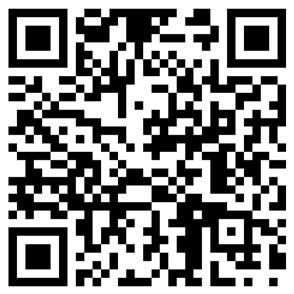
New content is shared in small chunks to support students in their understanding. After the initial explanation, the understanding of the material is then deepened through problem solving, group work and analysing exam questions. Physics is a very hands-on subject so whenever there is opportunity to do so, the learning of new content is supported with demonstrations or practical investigations.
In addition to discovering new material, we will also spend part of our lessons on content that we have already covered. Retrieval practice is the most effective way to ensure that we are prepared for the examination, and this will be a part of every lesson.
Year 12
• Waves, including the strange things that happen when waves meet.
• Particles and radiation, including antiparticles, quarks and quantum phenomena.
• Mechanics and materials, including projectile motion and collisions.
• Electricity, including resistivity and superconductivity.
• Practical skills.
Year 13
• Further mechanics, including oscillations and circular motion.
• Thermal physics, including gas laws.
• Fields and their consequences, including electrical fields, capacitors, gravitational fields, orbits, magnetic fields and electromagnetic induction.
• Nuclear physics, our knowledge of the nucleus and its application.
• An optional unit, ‘Turning points in Physics’, which builds on a range of the physics studied in earlier sections.
• Practical skills.
“A-Level Physics is a valuable course for developing a deep conceptual understanding of the laws of nature. The scientific process is followed as experimental skills are developed; analytical thinking and reasoning is encouraged from the beginning. These academic skills are all based in maths, as algebra, trigonometry and general mathematical fluency is greatly developed, leading physics students into the next step.”

Studying Pearson Edexcel A-level Politics is engaging, current, and debate-driven. The course covers UK politics and government, political ideologies (like socialism, conservatism, and liberalism), and global politics, including international relations and global institutions. You’ll explore how political systems work, how power is distributed, and how political decisions affect society. It’s ideal for students who enjoy following the news, debating issues, and thinking critically about democracy, rights, and global affairs.
Assessments are essay-based, so strong writing and argumentation skills are important. The content is dynamic and constantly evolving, making it a subject that feels relevant and thought-provoking.
Component 1: UK Politics
• Democracy and political participation.
• UK political parties.
• Electoral systems.
• Voting behaviour and the media.
• Core political ideas: conservatism, liberalism, and socialism.
Component 2: UK Government
• The constitution.
• Parliament.
• The prime minister and the cabinet.
• Relations between the branches.
• Non-core political ideas: nationalism.
Component 3: Comparative Politics: the USA
• The constitution.
• The presidency.
• Congress.
• The Supreme Court.
• Comparative approaches - how do US/UK politics compare?
Annabel Paterson
The Hayfield School
“I feel as if studying A level Politics has had a real world impact on me, I carry over important critical thinking skills and real world knowledge outside of education. The subject is not just a course you do and forget after the exam as the content is really interesting and helps me link real time events to items I have covered in lesson.”
Qualification Title
A-level Politics
Awarding Body

Psychology is the academic and scientific study of the brain, mind and behaviour. The role of biology, upbringing and culture on behaviour will be explored, and you will gain a greater understanding of why people act the way they do.
Whilst studying psychology, students may have the opportunity to experience talks from people who work in the field of psychology or to attend educational conferences with guest speakers. There will also be opportunities for students to enhance their learning experience by going on an a variety of trips, potentially including an overseas psychology trip.
Typical lessons include a range of activities where students work independently and collaboratively with others completing mini whiteboard tasks, exam questions and quizzes for example. All lessons involve students being active participants in their learning by taking part in class discussions and sharing thoughts and opinions about topics being studied.
• Paper 1 Exam - Memory, attachment in children, social influence (conformity and obedience), psychopathology (mental disorders).
• Paper 2 Exam - Approaches in Psychology (different perspectives), biological psychology, research methods used in Psychology.
• Paper 3 Exam - Schizophrenia, relationships, aggression, issues and philosophical debates in Psychology.
Outwood Academy Danum
“Psychology is honestly my favorite class. Every lesson feels like I’m learning something real and meaningful, things that actually explain how people think and act. It’s not just interesting, it’s fun, and I actually look forward to every lesson.”

Religion, Ethics and Philosophy (REP) is an exciting and challenging subject that provides an outstanding education in thinking and communicating. You will learn to evaluate and argue with precision, skills your future university and employer is looking for. This course gives students an opportunity to ask and consider the ‘big questions’ in life such as, “is there a God?”; “how should we behave and what do the words ‘right’, ‘wrong’, ‘good’, ‘bad’ actually mean?” and “how should Christians practice their faith today”? It also encourages students to reflect on and develop their own values, opinions and attitudes.
We use detailed study packs which we have in class and independent activities. This allows us to spend time discussing, challenging and evaluating ideas, concepts and theories from all aspects of the course. This enables us to develop essential essay writing skills. The course is enhanced by talks by speakers from universities and religious and non-religious organisations.
• Religion. Christianity – religious figures, sacred texts, religious concepts, social and historical developments in religious thought, e.g. who was Jesus? What is God’s nature? Is Christianity relevant today? Christian attitudes to inequality. Religious practices.
• Ethics. Religious and secular theories about morality, e.g. utilitarianism, situation ethics and ethical egoism, and their application to issues, e.g. polyamorous relationships, capital punishment, immigration and animal testing. The debate about free will and determinism.
• Philosophy. Arguments for the existence of God and challenges to them from atheism, science and psychology. The problem of evil and religious responses. Religious experiences and the debate around religious language.
Amalie Palmer-Hill
Retford Oaks Academy
“R.E.P is a fascinating and thought-provoking subject which allowed me to study the big questions about creation, morality, and what it means to be human.”
Qualification Title
A-level Religious Studies
Awarding Body
EDUQAS

In Sociology lessons, students engage in a range of learning activities including individual and group work, discussions and quizzes. Students are encouraged to discuss contemporary issues in society such as why people commit crime, or why social class affects educational achievement.
Sociology is a subject that develops critical and analytical thinking skills, so students are encouraged to read, analyse and discuss sociological research and theories.
Students are supported in developing their essay writing and evaluation skills. In addition, the department invites professional sociologists to talk to students about their research into society.
• Families and households: Changing patterns of family life, childhood, functions of the family, gender roles, and social policy.
• Education: Education policy, theories of the role of education in society, class, gender and ethnic differences in achievement.
• Beliefs: Theories of religious organisations including cults, the relationship between social groups, beliefs and practices, significance of religion in the contemporary world.
• Crime and deviance: Theories of crime, social patterns of crime, victims, prevention and punishment, global crime.
• Research methods: Surveys, interviews, observation, secondary sources.
• Sociological theories: Sociological views such as feminism, functionalism and postmodernism.
“Sociology provides a deeper understanding of human behaviour, social structure and the forces that shape our lives. It encourages you to think about different perspectives and provides a deeper understanding of social structures, inequality and helps you develop empathy towards individuals. It is a really interesting course and I really recommend it.”

Spanish is taught in a specialist language room meaning students have plenty of IT access to facilitate independently controlled listening practice (as in the A-level exam) and pair-work speaking practice. Lessons cover the four main language skills: listening, speaking, reading and writing and are taught, as far as possible, in the target language. Grammar teaching is also integrated within the teaching of the A-level topics. In addition to the three lessons, students have a separate speaking session in a pair / individually to enhance fluency and confidence in this skill area.
We offer students an opportunity to visit Spain during their course to further develop their cultural knowledge and linguistic competence. Students can participate in many Enrichment opportunities relating to cultural experience, languages in Higher Education and the world of work. Spanish A-level students can always expect lessons to be fun and relaxed yet challenging and supportive with a consistent focus on the teaching and learning needed in order to get students to where they need to be.
Students will study topics from a range of political, social and cultural themes all in relation to the Spanish-speaking world following the AQA A-level course:
• Traditional and modern values.
• Cyberspace.
• Equality of the sexes.
• Influence of idols.
• Regional identity in Spain.
• Cultural heritage.
• Immigration.
• Racism.
• Coexistence.
• Young people today, citizens of tomorrow.
• Monarchies and dictatorships.
• Popular movements.
In addition, students study a film and a book, and carry out an independent research project which forms a major part of their final A-level oral exam.
Rossington All Saints Academy
“Studying A-Level Spanish has improved my communication skills and given me a much deeper understanding of Hispanic culture, history, and traditions. The lessons are always engaging and interesting, which makes learning the language both enjoyable and effective. With the support of my teacher, I have made a lot of progress in a short space of time, and the course has really boosted my confidence with the language.”
Qualification Title
A-level Spanish Awarding Body
AQA

You will work in a welcoming, creative, open studio environment. Experiencing both traditional and contemporary Textile and Fashion Design processes. You will nave access to industry standard Mac suites, weaving looms, sewing machines and screen-printing equipment alongside a range or experimental processes and materials across the Visual Arts department.
You will engage with live briefs, thinking like a designer in industry, from the ideas generation stage, client profiling, and design ideas through to the production of final garments and exhibition pieces. You will have talks from practitioners working in the textiles industry, to help your progression into creative degrees and job roles. You will also have a direct progression route onto our Foundation Art and Design Diploma based at the NCLT Trust HQ in Normanton, West Yorkshire.
• Observational drawing
• Fashion illustration
• Garment construction
• Mark-making
• Fabric manipulation
• Embroidery
• Weave and knit
• Collage
• Printmaking
• Experimental textiles
• Felt-making
• Concept building and contextual research
• Portfolio presentation
• Time management and problem-solving skills
• Presentation skills
Maisie Williams
Orchard School Leverton
“This course truly evoked my passion for fashion. It allows you to express your creativity through garment construction and/or installation work. The skills you learn on this course help you to understand the intricacies of fashion that aren’t always considered and I absolutely love it! It’s helped me solidify my career choice as well.”
Qualification Title
A-level Art and Design (Textile Design)
Awarding Body

(Applied)
*This qualification is currently subject to a process of review and reform by the Department for Education.
If there are any changes to this qualification following your interview for a place at the college, we will be in touch to discuss possible alternative, but related, qualifications.
- Grade 4 in any two Sciences or 4-4
- Grade 4 in English
- Grade 5 in any two Sciences or 5-5
- Grade 4 in GCSE PE (if studied) or L2 Merit in a BTEC equivalent (if studied) - Grade 4 in English Language
- Grade 4 in GCSE PE (if studied) or L2 Merit in a BTEC equivalent (if studied)
- Grade 4 in English Language
- Grade 4 in GCSE PE (if studied) or L2 Merit in a BTEC equivalent (if studied)
Grade 4
- All students must have completed a minimum of 5 GCSE qualifications.
- All GCSE qualifications contribute to the average GCSE point score.
- GCSE Maths re-sit is required for any students with sufficiently strong GCSE results who have not yet achieved a grade 4 in GCSE Maths.
- Level 4 in GCSE English Language is a minimum entry requirement for all our courses. Some courses may require higher than level 4.
In BTEC Business, we ensure that our lessons allow opportunities for learners to practise developing employability skills. Lessons build on real-life examples to help learners see theory in practice.
In the past, we have had guest speakers from Morrisons and have also visited Cadbury World, Hull University and the Bank of England in London to further learners’ knowledge and understanding of the business world.
We have a range of IT suites to use for lessons and Microsoft Teams will be used as a library of resources to help aid independent learning in this subject.
The course contains both exams and coursework units, involves both theory and practical application and covers a wide range of topics including:
• Exploring business.
• Developing a marketing campaign.
• Personal and business finance.
• Recruitment and selection.
The Hayfield School
“During this subject you will gain practical, real-world skills in areas such as finance, management, and marketing which I think is good as these can all generally be applied to everyday tasks/problems.
Furthermore, I’ve found that this subject has opened up quite a few options for me when thinking about what I want to do after college, that being whether I decided to study business at a higher level at university or whether I’d go down the apprenticeship route.”
BTEC Extended Certificate in Business Awarding Body
BTEC

Lessons focus on the analysis of media texts and production techniques, understanding the way meaning is created. You will also develop the specialist creative skills necessary to create media products.
In Year 12, lessons will mainly focus on the analysis and exploration of existing media texts. Through a mixture of lesson materials, teacher delivery and independent work, you will learn how to deconstruct media texts and apply relevant theory. There will also be some opportunities to develop your creative production skills.
In Year 13, you will select to focus on either film production or magazine production, producing and planning a significant piece of creative work.
• Media Representations: An external assessment in which you will analyse a variety of media products. You will explore how meanings are created, how representations are constructed and how audiences interact with products. As preparation for this exam, you will explore media areas such as film, television, magazines, advertising and video games.
• Pre-Production Portfolio: You will produce professional planning materials which are required in the creative media industries for your major project.
• Film Production or Magazine Production: You will choose to create your very own major production project, specialising in film or magazine.
• Responding to a Commission: A task set by the exam board which will require you to plan and construct materials for a media production in timed conditions.
Doncaster UTC
“I really enjoy the balance between theory and practicality. We learn how to analyse products, but we also learn how to use editing software and how to make our own products. Even the theory side is made interesting by the case study texts, as they are enjoyable and well-known.”
BTEC

In Criminology lessons, students participate in a variety of learning activities as they progress through the course. Lessons include a range of teaching methods to support students in their learning, including independent research and group discussion and tasks. Students learn how the criminal justice system operates and investigate a number of case studies of crimes in society.
For the controlled assessments, students carry out extensive independent research and write a detailed report. This includes planning a campaign to raise awareness of crime in the first year and studying the process of crime investigation from the crime scene to the courtroom in the second year.
Students maintain a detailed folder of class resources and notes to prepare them for both forms of assessment used in this course - report writing and exams.
In addition, students can benefit from guest speakers who work in the field of crime and criminal justice.
• Changing awareness of crime: Types of crime, media and crime, official data on crime, crime prevention and awareness campaigns. (Year 1 Controlled Assessment).
• Criminological theories: Theories of criminality from biology, psychology and sociology. (Year 1 Exam).
• Crime scene to courtroom: The criminal justice system from investigation to verdict, personnel and techniques involved in criminal investigations and courtroom procedures. (Year 2 Controlled Assessment).
• Crime and punishment: Law-making, criminal justice, forms and functions of punishment. (Year 2 Exam).
Samuel Fourie
XP School
“This course has been great in giving me an insight into my future career, the course is interesting and covers many different topics and would recommend to anyone who finds crime and punishment interesting and would like to learn at a deeper level.”
WJEC Diploma in Criminology
Awarding Body
WJEC

Students study a range of dance genres and critically appreciate and analyse a range of professional works which supports their development and understanding.
Alongside this students enhance their dance technique and choreography skills which are assessed in a performance environment. Lessons are engaging and dynamic allowing students to explore their own creative vision.
During the course students have the opportunity to work with professional artists through workshops, see a range of live performances, compete in regional dance competitions and also have the opportunity to gain an insight to the professional dance world through the annual trip to Move it.
• Group performance workshop.
• Jazz dance technique.
• Choreography for live performance.
• Contemporary technique.
• Developing skills and techniques for performance
Ridgewood
“You cover so many different styles of dance and essential skills for the industry. BTEC Dance really helped me gain a good understanding of of why certain styles are the way they are as the course involves both practical and theory elements.
The whole performing arts department are incredibly collaborative and supportive, definitely one of my favorite things about the course.”
BTEC Extended Certificate in Performance (Dance)
Awarding Body
BTEC

In Year 12, the course is structured to develop a variety of skills in both digital design and photography. In Year 13, you will specialise and develop one personal and in-depth body of work. Students are encouraged to develop their skills in research, problem solving, collaboration, independent thinking, professionalism and marketing. Students will also understand the potential of self-employment and creative entrepreneurship. Students could expect to continue into professions such as marketing and communications, graphic design, digital media production, games design, photography, art-working or retouching, and more. The Visual and Digital Arts department has professional standard spaces with Apple Macs, drawing tablets, a photography studio, DSLR cameras and other equipment for student use. It also has a wide variety of other arts-based specialist equipment to encourage students to explore multidisciplinary techniques. We operate an ‘open door’ policy to allow students to use the equipment and studio spaces independently outside of lessons.
Over the course, you may study topics and skills such as:
• Adobe CC (Photoshop, Lightroom, Illustrator).
• Digital photography; the functions of a digital camera.
• Studio and location photography.
• Flash and lighting.
• Composition and layout.
• Colour and typography theory.
• Branding and logo design.
• Social media and marketing.
• Editorial design.
• Experimental image editing and manipulation.
• Creative business and freelancing skills.
• Visual and contextual research.
• Idea generation and working to a set brief.
• Critiquing your own work and that of others.
Ash Hill Academy
“I learn a variety of different ways to apply techniques to fit certain briefs in order to cater to certain audiences. I learn many values of composition and my teacher constantly helps me apply them.”
UAL Subsidiary Diploma in Visual Arts
Awarding Body
UAL

The Extended Certificate is for individuals interested in learning about the children’s care and education sector (0-8 years) with a view to progressing to a wide range of higher education courses and employment/training.
Progression Routes:
• Nursing – Child – BSc (Hons).
• Teacher Training – Childhood and Early Years Studies BA (Hons).
• Social Work – BA (Hons) Social Work.
• Psychology – Psychology BSc (Hons).
Course Content:
The qualification has four mandatory units covering the following topics:
• Children’s development.
• Keeping children safe – Health and safety and safeguarding responsibilities.
• Play and Learning.
• Research & Reflective Practice.
Qualification Title BTEC Extended Certificate AAQ in Early Childhood

Through a series of practical workshops and creative projects, you will develop the skills required to work towards a career in the games industry. Some of the things you will cover in lessons are 3D modelling software, how to use a game engine, 2D animation techniques and sound production for games. As well as this, you will work on researching, developing and pitching ideas for your own projects.
Lessons are a combination of practical, teacher-led workshops, theoretical delivery and creative project work. Sometimes you might be working in small groups but much of the work is done independently. We also have links with local games designers who will give you feedback on your ideas. We also visit games expos to see the latest innovations and universities to explore what degree courses are available in games design.
• A1: Skills Development – You will explore and develop different media skills relating to games design e.g. digital graphics, 3D and 2D animation, sound.
• A2: Creative Project – In response to a brief, you will plan, develop and produce a media product, applying the skills you learned in A1.
Bonni Rafferty
Doncaster UTC
“I really enjoy the Games Design course because it combines creativity with technical skills. We learn how to use industry-relevant software that allows me to bring my ideas to life through artwork and programming.
This course has given me a solid foundation for a future in game development or digital design.”
BTEC 540 Diploma in Creative Digital Media Practice (Games Design) Awarding Body
BTEC

The BTEC National in Health and Social Care (Extended Certificate) is an Alternative Academic Qualification (AAQ) designed for post-16 students with an interest in Health and Social Care and aiming to progress to higher education, higher level apprenticeships or full-time work in the care sector. Students will develop knowledge and skills throughout this qualification that are key to Health and Social Care related careers, such as organisation and critical thinking, communication, empathy and compassion skills.
This qualification allows students to engage in various aspects of the Health and Social Care sector, as well as gaining an understanding of developmental milestones and developing knowledge on the organisation, structure and normal physiological functioning of the human body. Students are offered trips and courses to enrich their understanding of theory, practice and career pathways, as well as the opportunity to complete a work placement in a Health and Social Care setting. Embedding work placements into the curriculum gives students a more broad and rich experience and provides them with the knowledge and skills needed to progress into careers such as nursing, midwifery, primary teaching and social work.
The units that you will complete over the two years of study are:
• Human lifespan development (external exam).
• Human biology and health (external exam).
• Health and Social Care practice (internal coursework unit).
• Promoting health education (internal coursework unit).
Rossington All Saints Academy
“I have enjoyed studying Health and Social Care at New College because it has allowed me to have a better understanding of what it is like in the healthcare settings. It has also allowed me to see and understand what a healthcare professional does. The teachers has supported me and they have always made sure that I am meeting all of my goals. I chosen this course as I’m the future I would like to be a nurse.”
BTEC Extended Certificate AAQ in Health & Social Care Awarding Body BTEC

*POTENTIAL NEW COURSE FOR 2026
Lessons are designed to be engaging and practical, combining theory with real-world application. You’ll explore mental health from multiple perspectives, discuss case studies, and use monitoring tools to assess wellbeing. Activities include reflecting on strategies to improve outcomes, promoting resilience, and creating mentally healthy environments.
The focus is on interactive learning that prepares you to apply knowledge in education, healthcare, social care, and everyday life. This course is assessed through a combination of coursework and examinations.
• Fundamentals of mental health and the individual
• Supporting and promoting mental health in organisations
• Mental health, wellbeing and society
• Community-based support for mental health and wellbeing
You’ll learn about the wide range of influences on mental health-lifestyle, environment, social and psychological factors-and examine their impact on wellbeing. The course also introduces practical strategies for early support and resilience building.
This course may be a very good option alongside BTEC Extended Diploma in Health and Social Care, particularly for students that were previously considering the double or triple health and social care course. Those double and triple courses have been discontinued by the government.
Level 3 Extended Certificate in Mental Health: Individuals and Society Awarding Body
Cambridge OCR
We are currently establishing interest in this qualification to determine whether we are able to offer it from September 2026. If you are interested in this qualification we will be pleased to discuss it with you during your interview.

The exciting new IT qualification has evolved to better link to the industry it aims to develop learners for, including the fast-paced field of cyber security. Students who study with us will develop a strong understanding of how IT supports the function of business and how to develop solutions with key stakeholders in mind.
A range of teaching and learning methods are employed in this course, from teacher led activities, to paired and group work, practical activities and workshop-style sessions for evidence gathering. Students will be working on industry standard hardware and software, for example, Microsoft Office and Adobe Creative Suite, to develop their project work.
Links to the IT industry exist with talks by specialists in cyber security and networking as well as visits to local businesses. University trips and talks are included over the two years, meaning IT students are well-prepared to progress in the field of IT and computer science.
The course is made up of four units, two of which are externally assessed through exams and make up two thirds of the course.
These are:
1. Information Technology systems. 2. Cyber security and incident management.
The other two units are internally assessed through coursework and are worth the final one third of the course.
These are:
3. Website development.
4. Relational database development.
Connor Bloomfield
South Axeholme Academy
“This course helps teach all the basics required for a future in IT. It provides hands-on experience with computers and the knowledge required to further develop your skills.
As well as this it provides an introduction to computers and their components to the laws that are required to thrive in an IT environment.”
BTEC Extended Certificate AAQ in IT
Awarding Body
BTEC

Throughout the course, a variety of different teaching methods are used to support learners’ knowledge and understanding. The lessons concentrate on varied retrieval techniques and group activities. The subject is taught using legal case law and students use this knowledge to apply to scenario-based activities.
Due to the nature of the subject, discussions and debates often occur. Learning is continued outside the classroom with regular visits to the local courts, and we have guest regular speakers including members of the legal profession and the National Crime Agency.
• Dispute solving in the English legal system. Civil dispute resolution, enforcement of civil law, how precedent works, application of the law of negligence, damages.
• Investigating aspects of criminal law. Statutory interpretation, legislation, delegated legislation, law reform, European law, legal profession, advice and funding, lay people, elements of a crime, non-fatal offences and sentencing.
• Applying the law. Fatal offences, property offences, general defences, police powers.
• Aspects of tort law. Law of negligence, occupiers’ liability, vicarious liability and land law.
• 50% internal assessment.
• 50% external set task.
• 4 units over 2 years.
South Axholme Academy
“Every lesson is different and we are constantly learning new things that are so interesting, making it exciting to attend every law lesson. You get an insight into what happens in the real world around us and learn interesting facts from the past that you would never have known about if you didn’t study law.
It is a very intriguing subject that has made me want to pursue a career in law.”
- Grade 4 in English Language
BTEC Extended Certificate in Applied Law
- GCSE minimum point score of 3.5
Awarding Body
BTEC

This course may be a very good option alongside BTEC Extended Diploma in Health and Social Care for students that were previously considering the double or triple health and social care course and who may be interested in health-related careers. Similarly, it may also be a good option for students also interested in studying BTEC Extended Diploma in Applied Science and who are interested in science-related careers. The double and triple courses in Applied Science, and in Health and Social Care, have been discontinued by the government.
Medical Science is ideal for you if you enjoy learning about human body systems, disease or have an interest in pursuing a career in healthcare or medical research. Medical Science develops key scientific skills to support progress to higher education or employment such as problem solving, organisation, research and analytical skills.
The course is assessed using a mix of exams and coursework. Lessons are taught by teachers who are knowledgeable and have a passion for their subject. You will carry out investigations and independent research as part of the course.
• Principles of human physiology.
• Anatomy and pathology.
• Biological molecules, cells and levels of organisation.
• Cardiovascular and respiratory systems.
• Digestive and renal systems.
• Nervous and endocrine systems.
• Musculoskeletal system.
Y12 Coursework Unit:
• Practical microbiology and infectious diseases.
• Health issues and scientific reporting: diagnostic techniques for assessing health issues; immune response and dysfunction; genetics and health; cancer; interpretation, analysis and evaluation of scientific information.
Y13 Coursework Unit:
• Biomedical science.
Rossington All Saints Academy
“The subject was enjoyable and will definitely benefit me for my future studies. The teachers were the most understanding, helpful and supportive I’ve ever had. The course allows you to broaden your knowledge and understanding whilst also being able to enjoy what you’re learning, especially as the teachers make it engaging in lessons.”

BTEC Music lessons are practically orientated; performance underpins everything we do in lessons. Much time is spent in lessons on solo and ensemble performance whilst developing the skills to be a good all-round performer.
Unit 1 focuses on the theoretical side of music and how important it is to understand the music we perform. Unit 2 considers how the music industry works and particularly how to plan and take charge of a large music event.
We have a suite of practice rooms which can be used for private practice, instrumental and vocal teaching and developing composition ideas. In addition, we create compositions using a number of industry standard notation software packages and digital audio workstations. Student performances take place around college and within the local community.
Trips to see professional concerts, musicals, and universities are arranged throughout the year. In addition, professional musicians and speakers regularly visit college to talk to our students.
Practical music theory and harmony (mandatory):
• Professional practice in the music industry (mandatory and externally marked). This is a written task that has to be completed in two weeks.
• Ensemble music performance (mandatory and externally marked). This is a task set by the exam board and will be completed within a set time frame. You will study one other unit, which is often solo performance, but this is dependent on your specific strength.
New College Doncaster
“The BTEC Music course allows the opportunity for so much creativity and collaboration. The amount of performances included helps students develop their social skills and confidence in from of an audience.”
BTEC Extended Certificate in Music Performance Awarding Body
BTEC

Lessons in UAL Performance and Production Arts are extremely practical and encourage collaborative work between students. Whether you are a keen performer or more interested in directing, backstage/technical support, there are numerous opportunities for you to develop your skillset.
Students work together with each other to create live shows that are then performed to live audiences. Students also have the chance to learn outside of the classroom by going on trips to see live theatre at various venues around Yorkshire.
• Units 1-4: An introduction to the skills necessary to explore their creative development.
• Units 5-7: Requires the student to apply their skills, knowledge and understanding in a series of production and performance assessments.
• Unit 8: Students will undertake a production and/or performance role in a performance. An examiner will watch the performance work.
• Work experience in business.
The Hayfield School
“It’s a amazing course for anyone wanting to be able to develop there skills in preforming arts if that’s a career they may be interested in.
It’s also a great way to meet many new people and help improve your confidence that can help you in later life.”
Qualification Title
UAL Diploma in Performing & Production Arts
Awarding Body
UAL

Psychology is the scientific study of the brain, mind, and behaviour. The role of biology, upbringing and culture on behaviour will be explored, and you will gain a greater understanding of why people act in the way that they do.
Applied Psychology involves using psychology in real-life situations. Students will write their own psychological reports, based on independent research into mental disorders, and conducting experiments. Applied Psychology is particularly suitable for students who are reasonably confident with exams, but also like to support their learning with coursework research type tasks also.
Typical lessons include a range of activities where students work independently and collaboratively with others, completing mini white board tasks, exam questions and quizzes, for example.
All lessons involve students being active participants in their learning by taking part in class discussions and sharing thoughts and opinions about topics studied.
Year 1
• Psychological approaches and applications to gender, aggression and consumer behaviour. Externally assessed exam.
• Conducting Psychological Research: Principles of research, data collection and analysis. Internally assessed written coursework reports.
Year 2
• Health Psychology: Stress and addiction theories and treatments. Externally assessed exam.
• Psychopathology: Definitions of mental illness, types of disorders and treatments.
Internally assessed written coursework reports.
Dana Durant
Ash Hill Academy
“This course is good because it is coursework based, so you can develop your knowledge overtime, rather than rely solely on exams. It is also a very interesting course which connects directly to everyday life which makes the subject feel really relevant and engaging.”
BTEC Extended Certificate in Applied Psychology Awarding Body
BTEC

Applied Science lessons include a mixture of both theory and practical methods. The theory lessons present new knowledge in small chunks with a focus on how to apply your knowledge and incorporate retrieval practice using online tools such as Kahoot and Seneca.
For the practical aspect of the course you will use equipment such as burettes, volumetric flasks to make and test your own solutions, colorimeters and chromatography to test the purity of solutions and components such as diodes, thermistors and LDRs to make and test electrical circuits.
You will also venture outside to collect biological data to apply statistical tests learnt to real-life situations.
• Fundamentals of science: You will study topics ranging from cells, atomic structure and bonding to forces and circuits.
• Science in society: You will examine how science is communicated to a variety of different audiences.
• Investigating science: You will develop your scientific skills including planning, recording and interpreting data and analysing and evaluating your own scientific findings.
• Applied Science: Two units in which you further develop your theory and practical skills.
“This year I’ve really enjoyed Applied Science as it’s really developed my knowledge and understanding of all three sciences. My teacher has had a huge impact on this due to her way of teaching and helping us understand how to do things correctly whilst also helping us maintain our independence.” South Axholme Academy

Lessons on the BTEC Extended Certificate in Sport provide a strong introduction to key areas of the sports industry, with a particular focus on anatomy and physiology. You’ll explore how the body responds to exercise, gaining a deep understanding of the musculoskeletal, cardiovascular and respiratory systems through interactive classroom sessions, group work and applied tasks. Practical elements help bring theory to life—such as testing components of fitness, observing movement patterns, or applying knowledge in gym-based scenarios.
You’ll complete coursework assignments and prepare for external assessments using real-world examples. Although this is a smaller qualification, there are still opportunities for trips, guest speakers and links to local sports providers. Lessons are engaging, supportive, and designed to build your confidence and knowledge, whether you’re planning to go on to higher education, combine with other A Levels, or move into a career in sport, fitness or health.
You will complete a range of units throughout your course, including:
• Anatomy and physiology.
• Fitness testing and programming for health, sport and wellbeing.
• Professional development in sports industry.
• Practical sports performance.
The Elizabethan academy
“Taking the BTEC Sport Certificate course was one of the best decisions I’ve made for my education and career. The course is incredibly well-structured, combining practical skills with essential theoretical knowledge, which has really helped me develop a strong understanding of sports science, fitness, and coaching. It has enabled me to develop my theoretical knowledge in a practical context.”

SCAN THE QR CODE TO FIND OUT HOW OUR SPORTS TEAMS PERFORMED IN OUR ANNUAL SPORTS REPORT
BTEC Extended Certificate in Sport Awarding Body
BTEC

Lessons on the BTEC National Diploma in Sport offer a dynamic mix of theory and practice, designed to reflect real-life sporting contexts. You’ll explore topics such as fitness training, coaching, and anatomy and physiology through classroom activities, group work, and practical sessions. Learning is hands-on and engaging, with opportunities to apply your knowledge in real scenarios—like leading sessions, analysing performance, or designing training programmes.
The course is enhanced by trips to universities and National Institutes of Sport, as well as potential international work placements through the Turing Scheme, with recent visits to Malta and Italy. You’ll also benefit from guest speakers, access to modern sports facilities, and supportive tutors with industry experience. Lessons are focused on developing your skills, confidence, and understanding, helping prepare you for further study or a career in the sports industry.
You will complete a range of units throughout your course, including:
• Anatomy and physiology.
• Fitness training and programming for health, sport and wellbeing.
• Professional development in the sports industry.
• Sports leadership.
• Application of fitness testing.
• Sports injury management.
• Work experience in sport.
• Investigating business in sport and the active leisure industry.
Samuel James Cole
“The BTEC Diploma in Sport course has enabled me to learn about the anatomy of the human body in an engaging and interesting way. The practical nature of the course has enabled me to develop my skills in a range of sports and analyse them to enable me to develop them further. The Leadership Unit has enabled me to develop my personal skills and become a more proactive and reflective coach.”
Rossington All Saints Academy SCAN


Lessons on the BTEC Extended Diploma in Sport are varied, practical, and designed to reflect real-world sporting environments. You’ll engage in interactive classroom sessions, practical activities, group projects, and presentations. One day you might be analysing performance using video feedback; the next, delivering a training session or exploring anatomy in a gym setting. Learning is active and applied, with case studies, guest speakers, and visits to universities and National Institutes of Sport enriching your experience. You’ll complete assignments based on realistic scenarios, such as designing fitness programmes or planning sports events.
There are also exciting opportunities for international work placements through the Turing Scheme, with recent destinations including Malta and Italy. With access to modern sports facilities and expert tutors with industry knowledge, lessons are supportive and focused on preparing you for careers in sport or progression to higher education.
You will complete a range of units throughout your course, including:
• Anatomy and physiology.
• Fitness training and programming for health, sport and wellbeing.
• Professional development in the sports industry.
• Sports leadership.
• Application of fitness testing.
• Practical sports performance.
• Coaching for performance.
• Sports injury management.
• Work experience in sport.
• Investigating business in sport and the active leisure industry.
• Development and provision of sport and physical activity.
• Research methods in sport.
• Exercise, health and lifestyle.
Mary-Beth Stephenson
Serlby Park Academy
“BTEC Extended Diploma in Sport is an amazing course to study. It combines the practical side of sport with theoretical aspects. The units on Leadership and Work Experience have enabled me to develop personally in an employment setting and this has influenced my next steps after college. The Turning Sports Coaching Trip abroad allowed me to develop this further and challenged me to become more a more affective communicator.”

SCAN THE QR CODE TO FIND OUT HOW OUR SPORTS TEAMS PERFORMED IN OUR ANNUAL SPORTS REPORT
BTEC Extended Diploma in Sport
Awarding Body
BTEC

We offer different qualifications on the Uniformed Protective Services course from the Extended Certificate (1 A-level equivalent) to the Extended Diploma (3 A-level equivalent). The course is an introduction to the protective services sector and predominantly focuses on agencies such as the police, fire service, armed services and prison service. This pathway is ideal for supporting learners who want to progress to higher education courses in the sector, before entering employment. The course is diverse, exciting and challenging and gives learners the opportunity to not only study inside the classroom but to also take part in fitness focused units and various offsite activities.
Throughout the duration of the course, you will be given the opportunity to grow in confidence with a variety of different educational visits, including paintballing, water-sports and army days. It also enhances your knowledge on specific services through insight days and guest speaker sessions.
You will have the chance to attend university open days to gain important information on various related courses which will help to widen your options and support your aspirations.
Each course is made up of various units comprised of both internally assessed coursework and one or more externally assessed exam. The content delivered on the course is varied and may include some of the below units.
• Behaviour and discipline in the Uniformed Protective Services.
• Teamwork, leadership and communication in the Uniformed Protective Services.
• Physical preparation, health and wellbeing.
• Skills for outdoor activities and the Uniformed Protective Services.
• Introduction to criminology.
Rossington All Saints Academy
“This course has allowed me to be able to express myself to other students and my teachers through the topical class work which has encouraged me and all of us to work together as a team. This has improved my personal and group communication skills and increased my confidence levels both in and out of college.”
BTEC Extended Certificate in Uniformed Protective Services
Awarding Body
BTEC
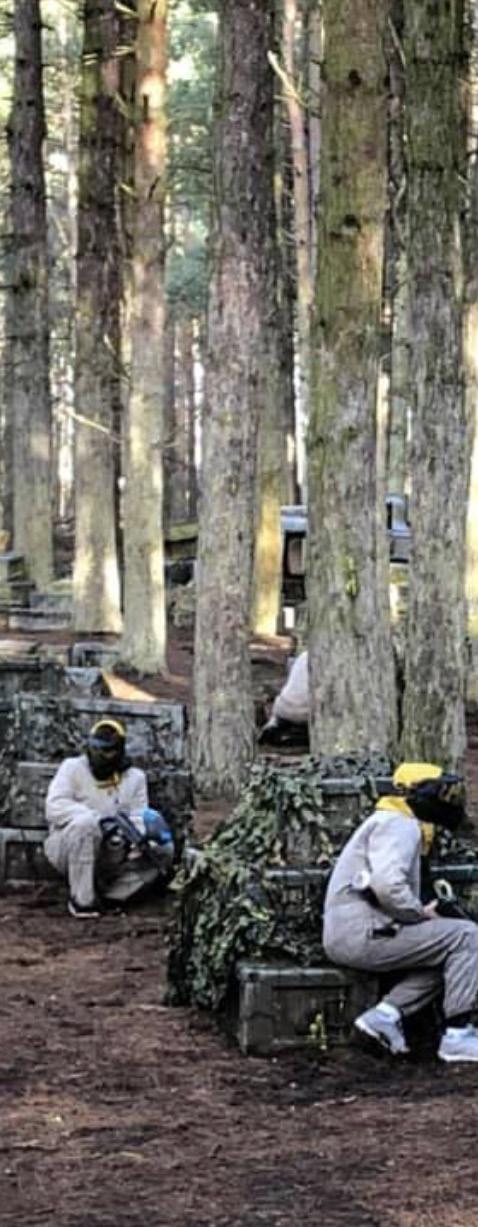
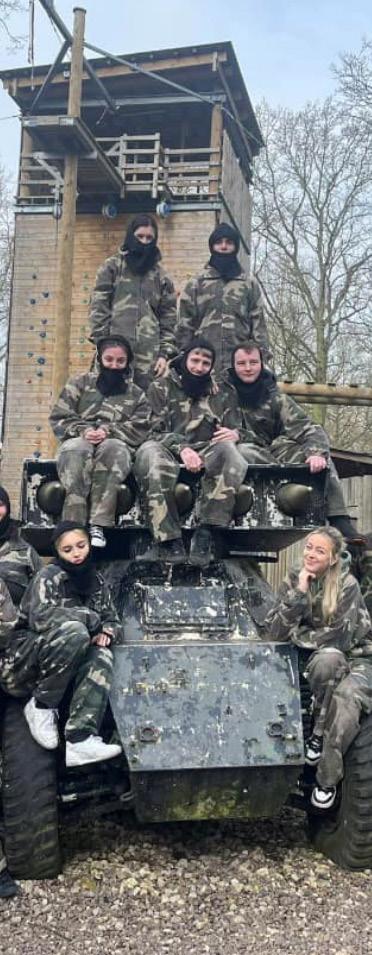
This BTEC Level 3 Diploma in Uniformed Protective Services is designed for students interested in pursuing a career within the emergency services, military, or other uniformed protective roles. The course provides a comprehensive understanding of the knowledge, skills, and behaviours essential to working effectively in public safety and security sectors.
Through a combination of examinations, practical assignments, theoretical studies, and real-world scenarios, learners will explore topics such as law enforcement, public safety, emergency response, conflict management, and community engagement. The course also emphasizes teamwork, leadership, communication, and fitness—key attributes for success in protective services. This course includes various physically demanding tasks both in and out of college placing individual outside their comfort zones. Ideal for those aiming to progress to higher education, apprenticeships, or employment in policing, fire and rescue, the armed forces, prison service or private security, this qualification equips students with the practical experience and theoretical foundations to thrive in demanding uniformed professions.
• Citizenship and Diversity.
• Behaviours and Discipline.
• Expedition Skills.
• Teamwork, leadership and Communication.
• Government and the UPS.
• Physical Preparation.
• Police Powers.
The Hayfield school
“This course is all about team cohesion. There is a whole host of team activities (e.g. paintballing) which not only requires problem-solving, communication and tenacity, but is fun & engaging! It gets you out of your comfort zone. The course helps me to develop my leadership skills and qualities, builds my resilience and discipline, as well as gaining so much knowledge into all the different kinds of public & protective services. The UPS teachers are always here to support and guide me whilst completing college work.”
Qualification Title
BTEC Diploma in Uniformed Protective Services
Awarding Body
BTEC
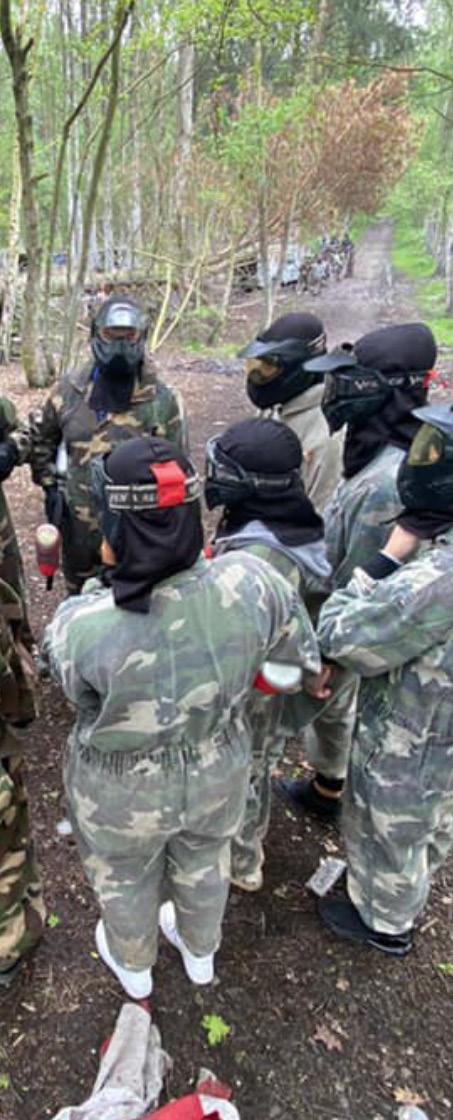
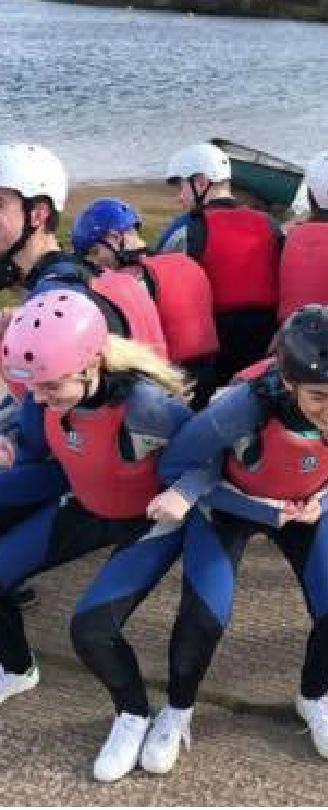
If you’re passionate about a career in the police, fire service, military, or other emergency and protective roles, the BTEC Level 3 Extended Diploma in Uniformed Protective Services is the perfect stepping stone. This extended diploma offers a more in-depth and comprehensive study, giving you the skills and knowledge needed to excel in demanding uniformed professions.
Throughout the course, you’ll cover a wide range of topics including law enforcement, emergency response, public safety, conflict management, and leadership. You’ll also develop essential skills like teamwork, communication, fitness, and decision-making through practical activities and real-life scenarios. This course includes various physically demanding tasks both inside and outside of college, placing individuals outside their comfort zones. The course offers insight into the UPS roles, expectations and real-life experiences linked with each. This is offered through internal assignments over 2 years, examination units and various physically demanding practical assessments and scenarios. There are opportunities to engage with the UPS directly, such as fire, military, police, and prison services. This course gives a real-life view of what life within the various branches of the UPS is like and enables students to prepare for their chosen career.
• Citizenship and Diversity.
• Behaviours and Discipline.
• Expedition Skills.
• Teamwork, leadership and Communication.
• Government and the UPS.
• Physical Preparation.
• Police Powers.
• Professional Development.
• Planning for Emergency response to Incidents.
• Custodial Care.
Serlby Park Academy
“The UPS course is a good way to get you out of your comfort zone and learn life skills whilst also gaining experience. This course is good for me as it challenges me and pushes me to think outside the box on a daily basis and has increased both my academic and overall knowledge.“

Our team of Progress Tutors, all with knowledge, skills and experience of providing advice and guidance for young people, will be the ones who will provide the first line of support. If you are finding the subjects difficult then your Progress Tutor will arrange for you to attend additional sessions such as our subject access period. Furthermore, our study support teams will be on hand to provide individual help for students requiring help with study skills, writing skills and GCSE Maths.
The college also provides a confidential counselling service that offers students a place and time to think and talk about specific problems and difficulties you may be having.
Yes. We ask students to remain in subjects for the first week to ensure you give them a chance before providing a three week zone in September where we allow students to change subjects. This is dependent upon there being places available in the subjects you would like to change to, and you must have the right subject specific entry requirements. Finally, we arrange for you to sit in on a lesson just to ensure you know what the new subject entails.
If studying A-levels, you will study three A-levels unless agreed with the college that you may study four. If you have not achieved Level 4 in GCSE Maths then you will take 3 A-levels plus GCSE Maths resit. If studying Applied General qualifications you can choose to study different combinations such as:
• BTEC/CTEC Extended Diploma = (three A-level equivalent).
• BTEC/CTEC Diploma = (two A-level equivalent).
• BTEC/CTEC Extended Certificate = (one A-level equivalent).
• UAL Awarding Body Diploma = (one A-level equivalent).
• UAL Awarding Body Extended Diploma = (three A-level equivalent).
• WJEC Diploma = (one A-level equivalent).
Your Applied General programme must add up to the equivalent of at least three A-levels. Your tutorial will fit alongside your chosen subjects on your timetable each week.
A-levels are predominantly assessed by exams. Although some A-levels have some coursework, this is usually a relatively small element of the assessment. In contrast, in our Applied General qualifications (BTEC, CACHE, UAL Awarding Body and WJEC) coursework usually makes up 50% or more of the qualification, alongside mandatory exams or controlled assessments.
This means that if you find exams difficult, you should consider taking an Applied General qualification.
How Will My Parents/Guardians/Carers Know If I Am Doing Well at College?
At New College we have a fantastic system that allows parents, guardians and carers to remain fully informed of your progress. You and your parents will be given access to Cedar (accessed via the Internet) using the email address you gave us on your application form.
This enables them to see your attendance and performance as lessons take place. It also informs them of all the Cedar assessment grades you achieve and it allows them to read all pastoral logs that staff write about you.


Because this is as important to us as it is to you, we provide as much quality advice and guidance as possible before enrolling onto your chosen subjects. This process is made up of four stages.
• Firstly, our open events are centred around subject choices. Both our staff and current students are available to give advice and answer questions whether you would like a member of staff’s perspective or the view of our current students.
• You will then be invited to an Interview Evening with our experienced interviewers where subject choices and career ambitions will be discussed.
• You will then be invited to attend our Offer Holder Day once you have left school in July. After spending the day in subject sessions you will discuss with your Progress Tutor whether you are happy with your chosen subjects.
• Finally, at enrolment, you will have an interview which again will focus on your subject choices, but this time will take into account the GCSEs you have achieved. A short discussion with a senior member of staff will follow to check that the subjects you have chosen are suitable for you and your aspirations.
Lessons start at 8.50am and finish at 4.00pm on most days. However, your day will depend on your timetable.
Students are only registered in timetabled lessons so free periods, which we refer to as ‘directed time’, are up to you. During this time we will expect you to manage a balance between meeting friends and studying in one of our learning zones.
For example, if your first lesson of the day is not until 10:35am then you will not be expected to be in College until then, unless you decide to come in voluntarily or you use a college bus.

